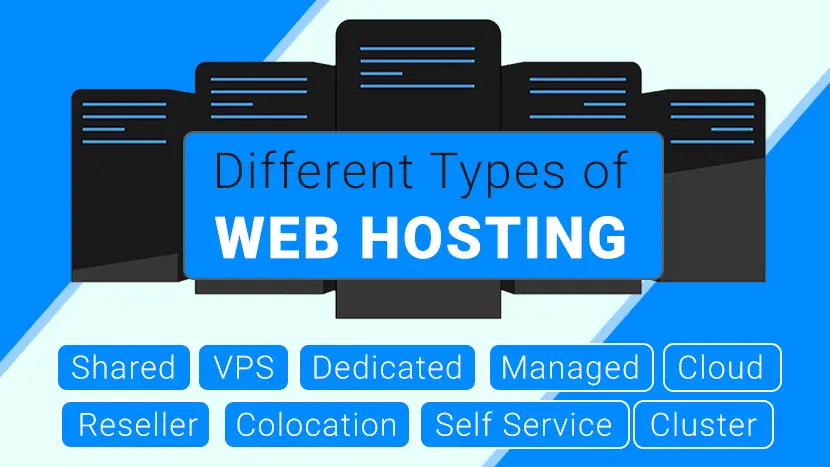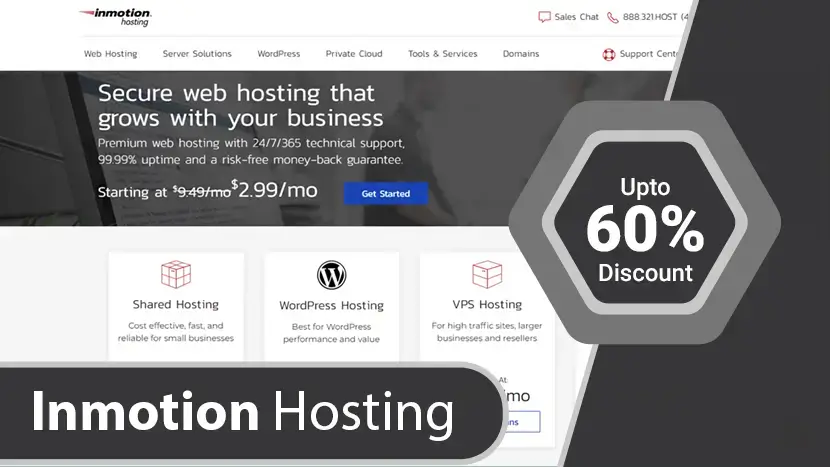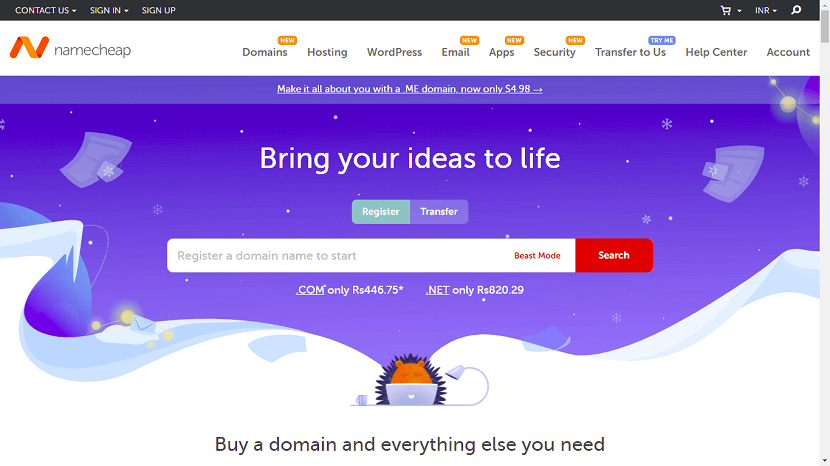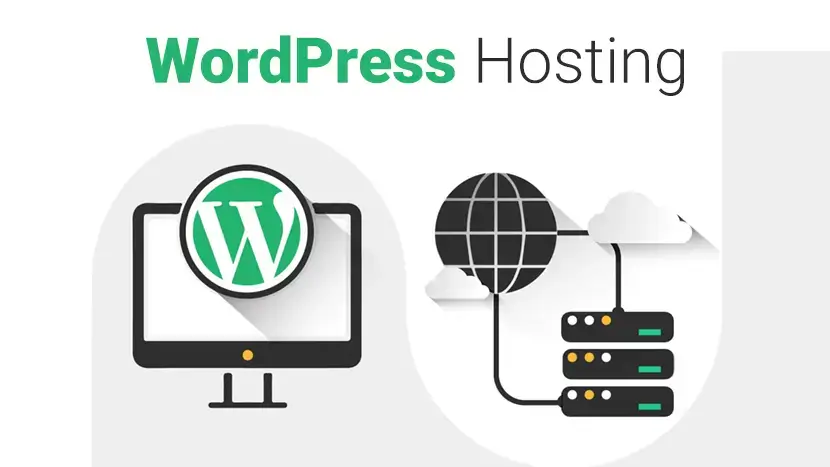30 Best Web Hosting Services Company
Last updated on January 19, 2025 by RGB Web Tech

Introduction of Cheap Web Hosting Service
Cheap web hosting service refers to a type of web hosting that is available at a low cost. This hosting service is suitable for individuals, small businesses, or anyone who needs a simple website without the need for advanced features or high-performance servers.
A cheap web hosting service usually offers a shared hosting plan, where multiple websites are hosted on a single server. This type of hosting service is typically less expensive than other hosting options like dedicated hosting or VPS hosting, as the cost of server maintenance and upkeep is shared among multiple users.
While cheap web hosting services may have some limitations, such as limited storage space or bandwidth, they can still provide users with the basic tools and features needed to create and manage a website. These features may include a website builder, email accounts, and access to cPanel or other management tools.
Overall, a cheap web hosting service can be a good option for those on a tight budget who need to get a website up and running quickly without the need for advanced features or customization. It is important to research different providers to find one that offers reliable service and good customer support, as well as a plan that meets your specific needs and requirements.
Table of Article Contents
- What is Web Hosting?
- Top 30 Cheap Web Hosting Service Providers
- Advantages of Cheap Web Hosting Service
- Disadvantages of Cheap Web Hosting Service
- Types of Cheap Web Hosting Service
- Paid V/S FREE Cheap Web Hosting Service
- How to choose Cheap Web Hosting Service?
- Features of Cheap Web Hosting Service
- FAQs
- Conclusion
- Video
What is Web Hosting?
Web hosting refers to the service of providing storage space and access to web servers to host a website on the internet. In simpler terms, web hosting allows individuals or organizations to make their website accessible via the World Wide Web.
When someone wants to access a website, they enter the website's domain name (such as www.example.com) into their web browser. The browser then sends a request to the web hosting server where the website is stored, and the server responds by sending the website's content back to the user's browser, which displays it on the screen.
Web hosting services can be offered by companies that specialize in web hosting, known as web hosts or hosting providers. These companies provide different types of web hosting plans, such as shared hosting, VPS hosting, dedicated hosting, and cloud hosting, each with different levels of performance, security, and scalability.
Web hosting also involves the use of various software and technologies to manage the hosting environment and provide website owners with tools and features to manage their websites, such as cPanel, FTP access, database management, and email hosting.
Overall, web hosting is an essential service that allows businesses and individuals to establish an online presence and make their website accessible to anyone with an internet connection.
Top 30 Cheap Web Hosting Service Providers
Here are the top 30 cheap web hosting service providers along with their sales, discount and pricing plans:
- Exclusive Sale - Upto 60% OFF
- Starting at
$9.99.00$3.49/month*
Inmotion Hosting
- Alexa Rank 5,622
- Exclusive Sale - Upto 75% OFF
- Starting at
$7.99$1.99/month*
iPage
Advantages of Cheap Web Hosting Service
Here are some advantages of using a cheap web hosting service:
1. Affordability: The most obvious advantage of using a cheap web hosting service is affordability. With low-cost plans, you can get started with your website without breaking the bank.
2. Easy to Use: Most cheap web hosting services provide easy-to-use control panels and website builders, making it easy for even beginners to set up their websites.
3. Scalability: Cheap web hosting plans often allow you to upgrade to higher plans as your website grows. This allows you to start with a basic plan and upgrade as needed, without having to switch to a new provider.
4. Technical Support: Despite being low-cost, most cheap web hosting services offer technical support around the clock to help you with any issues you may encounter.
5. Flexibility: Many cheap web hosting services offer a range of plans with different features, allowing you to choose the one that best fits your needs and budget.
6. Good for Small Websites: If you have a small website with low traffic, a cheap web hosting service may be all you need. You can save money on hosting fees and invest in other areas of your website or business.
7. Backup and Security: Even cheap web hosting services offer backup and security features, protecting your website from data loss and security breaches.
Overall, cheap web hosting services can be a great option for individuals and small businesses looking to launch their website on a budget. However, it's important to research and compare different providers to find the one that best meets your needs and budget.
Disadvantages of Cheap Web Hosting Service
While there are many advantages of using a cheap web hosting service, there are also some potential disadvantages to consider:
1. Limited Resources: Cheap web hosting services often have limited resources, such as storage, bandwidth, and processing power. This can affect the performance of your website and limit its scalability.
2. Reliability: With a low-cost hosting plan, you may experience more downtime or slower website loading times due to the sharing of resources among multiple users.
3. Customer Support: While many cheap web hosting services offer 24/7 customer support, the quality of support may be limited due to the lower price point. You may not receive as much help or expertise as you would with a more expensive hosting provider.
4. Limited Features: Cheap hosting plans may have fewer features and limitations, such as limited email accounts, no automatic backups, or no advanced security features.
5. Shared Hosting: Most cheap web hosting plans are shared hosting, which means your website shares the server with other websites. This can cause performance issues or security risks if one of the other websites on the server experiences a problem.
6. Renewal Costs: Some cheap web hosting providers offer promotional rates for the first year, but the renewal costs may be higher. This can catch some people off guard and cause unexpected expenses.
Overall, cheap web hosting services can be a good option for those on a tight budget, but it's important to consider these potential disadvantages and do your research before making a decision. Look for a hosting provider that balances affordability with reliability, features, and customer support.
Types of Cheap Web Hosting Service
There are several types of cheap web hosting services available, each with its own advantages and limitations. Here are some of the most common types:
1. Shared Hosting:Shared hosting is the most common type of hosting, where multiple websites share the same server and its resources, including storage space, bandwidth, and CPU. It is an affordable option for small businesses and individuals who are just starting with their website.
2. WordPress Hosting:WordPress hosting is a specialized type of web hosting designed specifically for websites built on the WordPress content management system (CMS). WordPress is the most popular CMS in the world, used by millions of websites to create and manage their content.
3. Virtual Private Server (VPS) Hosting:VPS hosting involves a server that is partitioned into multiple virtual servers, each with its own resources, operating system, and control panel. It is a step up from shared hosting, providing more control, flexibility, and security.
4. Dedicated Hosting: With dedicated hosting, a website gets its own server, which means all the resources are exclusively dedicated to that website. This option provides the highest level of control, flexibility, and security, but it can also be expensive.
5. Cloud Hosting:Cloud hosting involves a network of interconnected servers that work together to provide hosting resources. This type of hosting is highly scalable, flexible, and reliable.
6. Managed Hosting:Managed hosting involves a hosting provider managing and maintaining a website's server, including updates, security, backups, and more. This option is ideal for those who do not have the technical expertise to manage their own server.
7. Reseller Hosting:Reseller hosting allows individuals or businesses to purchase hosting resources from a hosting provider and resell them to their clients, usually at a higher price. It is a way to start a web hosting business without the need for expensive infrastructure.
8. Colocation Hosting:Colocation hosting, also known as colo hosting or colocation, is a type of web hosting where a company or individual rents space in a data center to store their own servers and equipment. Unlike traditional web hosting, where a hosting provider owns and manages the servers, in colocation hosting, the client owns and manages their own servers and equipment.
9. Self Service Hosting:Self-service hosting, also known as unmanaged hosting, is a type of web hosting where the client is responsible for all aspects of managing their website, including server configuration, software installation, security, and maintenance. The hosting provider only provides the physical server hardware and internet connectivity, but no management services or technical support.
10. Cluster Hosting:Cluster hosting, also known as cloud hosting or clustered web hosting, is a type of web hosting that uses a cluster of servers to host websites and applications. In a cluster hosting environment, multiple servers work together to provide greater performance, scalability, and reliability than traditional hosting options.
Paid V/S FREE Cheap Web Hosting Service
When it comes to web hosting, you often get what you pay for. While free hosting may seem like an attractive option for those on a tight budget, there are some key differences between paid and free cheap web hosting services that you should consider.
Paid Web Hosting Service:
Advantages:
- More reliable: Paid web hosting services typically offer more reliable and consistent performance than free hosting services.
- More resources: Paid hosting plans typically offer more resources, such as storage, bandwidth, and processing power, than free hosting plans.
- Better customer support: Paid hosting providers often offer better customer support, with faster response times and more experienced technicians.
- More features: Paid hosting plans typically offer more features and tools, such as automatic backups, advanced security features, and website builders.
Disadvantages:
- Cost: Paid hosting plans come with a cost, which may be a barrier for those on a tight budget.
- Contract length: Many paid hosting providers require a minimum contract length, which may not be suitable for those who are unsure about their website's future needs.
Free Web Hosting Service:
Advantages:
- No cost: The main advantage of free hosting is that it's free, making it a good option for those on a tight budget.
- Easy to use: Free hosting services often offer simple and easy-to-use website builders and control panels.
- No contract: Free hosting services typically don't require a contract, which provides more flexibility.
Disadvantages:
- Less reliable: Free hosting services often have limited resources and may not offer consistent performance or uptime.
- Limited features: Free hosting plans may have limited features and may not offer advanced tools such as automatic backups or advanced security features.
- Limited support: Free hosting providers may not offer as much support as paid providers, and the support may not be as experienced or responsive.
- Advertisements: Some free hosting services display advertisements on your website, which can be distracting or unprofessional.
Overall, if you're serious about your website and want reliable performance, more features, and better support, paid hosting is generally the better choice. However, if you're on a tight budget and don't need advanced features, free hosting can be a good option to get started.
How to choose Cheap Web Hosting Service?
Choosing the right cheap web hosting service can be a daunting task, especially if you're new to web hosting. Here are some key factors to consider when choosing a cheap web hosting service:
1. Reliability and Uptime: Choose a web hosting company that has a reputation for high uptime and reliability. You want a provider that guarantees at least 99.9% uptime, ensuring that your website is always available to visitors.
2. Server Speed and Performance: Choose a web hosting provider with fast servers and high performance. Slow-loading websites can negatively impact user experience and search engine rankings.
3. Scalability and Flexibility: Choose a web hosting provider that can scale and grow with your website. Your hosting plan should allow you to easily upgrade or downgrade your resources as your needs change.
4. Security: Choose a web hosting provider that takes security seriously, with measures such as SSL certificates, firewalls, malware scanning, and regular backups to protect your website and data.
5. Customer Support: Choose a web hosting provider that offers reliable and accessible customer support, with multiple channels such as phone, email, and live chat available 24/7.
6. Pricing and Value: Choose a web hosting provider that offers a good balance between pricing and value, with transparent pricing and no hidden fees. Compare pricing and features across multiple providers to find the best fit for your needs and budget.
7. User-Friendly Control Panel: Choose a web hosting provider that offers a user-friendly control panel, such as cPanel, which allows you to easily manage your website, email, and other hosting features.
By considering these factors, you can choose a best website hosting service that meets your need and provide a reliable platform for your website.
Features of Cheap Web Hosting Service
Cheap web hosting services may vary in terms of the specific features they offer, but here are some common features you can expect from a good cheap web hosting service:
1. Storage Space: Web hosting provides storage space for all website files, including images, videos, and web pages.
2. Bandwidth: Bandwidth refers to the amount of data that can be transferred between the website and its visitors. Web hosting providers offer different bandwidth limits, so choose a plan that meets your website's needs.
3. Domain Name: A domain name is the website address that visitors use to access your site. Many web hosting providers offer domain registration services.
4. Email Accounts: Web hosting often includes email accounts, which allow you to use your domain name for email addresses, such as [email protected].
5. Control Panel: A control panel allows you to manage your website, email accounts, and other hosting features.
6. Security Features: Web hosting providers offer various security features, such as SSL certificates, firewalls, and malware scanning, to protect your website and data from online threats.
7. Website Builder: Some web hosting providers offer website builders, which allow you to create a website without coding or design skills.
8. Backup and Recovery: Web hosting providers should offer regular backups and a recovery system in case of data loss or website issues.
9. Technical Support: Good web hosting providers offer 24/7 technical support, with multiple channels such as phone, email, and live chat.
10. Scalability: As your website grows, you may need more resources, so choose a web hosting provider that allows you to easily upgrade or downgrade your plan to meet your needs.
FAQs - Cheap Web Hosting Service
Here are some frequently asked questions about cheap web hosting service:
1. What is a cheap web hosting service?
Answer : Cheap web hosting service is a hosting service that offers web hosting at a low cost, usually starting at a few dollars per month. These hosting services are suitable for small websites and individuals who have a limited budget.
2. What are the advantages of a cheap web hosting service?
Answer : The advantages of cheap web hosting services are that they are affordable, easy to use, and can provide all the necessary features to host a website. They are also suitable for small businesses and individuals who have a limited budget.
3. What are the disadvantages of cheap web hosting service?
Answer : The disadvantages of cheap web hosting service are that they may not provide the best performance, uptime, or customer support. They may also have limitations on the resources and features provided.
4. What are the types of cheap web hosting services?
Answer : The types of cheap web hosting service include shared hosting, VPS hosting, cloud hosting, and reseller hosting. Each type has its own advantages and limitations.
5. What should I look for when choosing a cheap web hosting service?
Answer : When choosing a cheap web hosting service, you should consider factors such as price, uptime, performance, features, support, scalability, and reputation.
6. Can I upgrade my hosting plan later?
Answer : Yes, most hosting providers allow you to upgrade your hosting plan as your website grows and requires more resources.
7. Is a free web hosting service a good option?
Answer : Free web hosting service may be a good option for personal websites or experimental projects, but it may not provide the best performance, uptime, or security. It may also have limitations on the resources and features provided. Paid hosting services are generally recommended for businesses and serious websites.
8. What is bandwidth?
Answer : Bandwidth is the amount of data that can be transferred between your website and its visitors. Web hosting providers offer different bandwidth limits, so choose a plan that meets your website's needs.
9. What is a domain name?
Answer : A domain name is the website address that visitors use to access your site. Many web hosting providers offer domain registration services.
10. What is a control panel?
Answer : A control panel is a web-based interface that allows you to manage your website, email accounts, and other hosting features.
11. What is SSL?
Answer : SSL (Secure Sockets Layer) is a security protocol that encrypts data between the website and its visitors. It is important for securing online transactions and protecting sensitive data.
12. What is a website builder?
Answer : A website builder is a tool that allows you to create a website without coding or design skills. Some web hosting providers offer website builders as part of their hosting plans.
13. What is uptime?
Answer : Uptime refers to the amount of time that your website is online and accessible to visitors. Good web hosting providers guarantee at least 99.9% uptime.
14. What is shared hosting?
Answer : Shared hosting is a type of hosting where multiple websites share the same server and its resources. It is an affordable option for small businesses and individuals who are just starting with their website.
15. What is VPS hosting?
Answer : VPS hosting involves a server that is partitioned into multiple virtual servers, each with its own resources, operating system, and control panel. It is a step up from shared hosting, providing more control, flexibility, and security.
16. What is dedicated hosting?
Answer : Dedicated hosting involves a website getting its own server, which means all the resources are exclusively dedicated to that website. This option provides the highest level of control, flexibility, and security, but it can also be expensive.
Conclusion - Cheap Web Hosting Service
In conclusion, cheap web hosting services are an excellent option for individuals and small businesses that have a limited budget. While they may have some limitations compared to more expensive hosting options, they can provide all the necessary features to host a website. When choosing a cheap web hosting service, it's important to consider factors such as price, uptime, performance, features, support, scalability, and reputation. By doing your research and comparing multiple hosting providers, you can find a reliable and affordable hosting service that meets your needs.
You now know which the best Web Hosting Services company is, and you are ready to try one out. Good luck in the world of hosting!
If this article is helpful for you, please share it on your social media handles Because sharing is caring!
If you found this article helpful, we encourage you to share it on your social media platforms—because sharing is caring! For more information about article submissions on our website, feel free to reach out to us via email.
Send an emailWritten by RGB Web Tech
Latest Technology Trends
Latest technology trends shaping the future, including AI advancements, blockchain innovation, 5G connectivity, IoT integration, and sustainable tech solutions. Explore breakthroughs in quantum computing, cybersecurity, augmented reality, and edge computing. Stay ahead with insights into transformative technologies driving innovation across industries and revolutionizing how we live, work, and connect.
10 Different Types of Web Hosting
Last updated on January 19, 2025 by RGB Web Tech

There are different types of web hosting services. So, it can be very difficult to figure out which type of web hosting you need or choose.
In the article, I hope to teach you everything you need to know about web hosting. There are many kinds of web hosting. I can easily see how people get confused so quickly. I will cover the following:
- Shared Hosting — Shared hosting is the most cost-effective plan for entry-level websites.
- VPS Hosting — VPS hosting is for websites that have outgrown shared hosting.
- WordPress Hosting — WordPress hosting optimized for WordPress sites.
- Dedicated Hosting — Dedicated hosting is Enterprise-level servers for large websites.
- Cloud Hosting — Cloud hosting is best for websites that are growing rapidly.
- Reseller Hosting — Reseller hosting is for agencies, web developers, and web designers.
- Managed Hosting — Managed hosting is an IT hosting model in which the client leases servers or cloud computing resources.
- Colocation Hosting — Colocation hosting is where you rent space for your IT hardware at a 3rd party provider’s data center facility.
- Self Service Hosting — Self hosting is a form of running your own website or application by setting up a server and network yourself.
- Cluster Hosting — A Cluster hosting is a host that is configured to take over the role of another host server within a cluster.
Shared Hosting
Shared hosting is a type of web hosting where a single physical server hosts multiple sites. Many users utilize the resources on a single server, which keeps the costs low. Users each get a section of a server in which they can host their website files. Shared servers can host hundreds of users. Each customer using the shared hosting platform’s server has access to features like databases, monthly traffic, disk space, email accounts, FTP accounts and other add-ons offered by the host. System resources are shared on-demand by customers on the server, and each gets a percentage of everything from RAM and CPU, and other elements such as the single MySQL server, Apache server, and mail server.
VPS Hosting
VPS is short for a Virtual Private Server. VPS hosting is one of the most popular hosting services you can choose for your website. It uses virtualization technology to provide you with dedicated (private) resources on a server with multiple users.
It’s a more secure and stable solution than shared hosting where you don’t get a dedicated server space. However, it’s smaller-scale and cheaper than renting an entire server.
VPS hosting is usually chosen by website owners who have medium-level traffic that exceeds the limits of shared hosting plans but still don’t need the resources of a dedicated server.
WordPress Hosting
WordPress hosting is just hosting that has been optimized to better meet WordPress’ performance and security needs. It also typically includes one-click WordPress installs to make it easy to get started with WordPress. And some WordPress hosts will even automatically update your WordPress software as needed.
Dedicated Hosting
Dedicated hosting is a term used to describe web hosting packages that provide a dedicated server with dedicated resources to a single client. Dedicated hosting plans are ideal for WordPress websites with a very large number of visitors. Many WordPress hosting service providers offer Dedicated Hosting plans along with shared and VPS hosting plans.
Cloud Hosting
Cloud hosting is a type of web hosting which uses multiple different servers to balance the load and maximize uptime. Instead of using a single server, your website can tap into a “cluster” that uses resources from a centralized pool. This means that even if one server fails, another kicks in to keep everything running.
Visualize the cloud as a web of different computers which are all interconnected. As more machines are hooked up to the network, more resources are added to the overall cloud.
With cloud hosting, you get a part of the so-called cloud cluster. As opposed to traditional web hosting, where you get a certain amount of space from a single server.
The main benefits of cloud hosting include a major focus on uptime, isolated resources, easy scaling, and a dedicated IP address.
Reseller Hosting
Reseller web hosting is an option that involves one company (a hosting provider) renting hard drive space and bandwidth to another company (small-midsize business), who then rents the space to third parties (entrepreneurs-small business). Simply put, reseller hosting is the ability to provide hosting to your own clients as if you yourself were the web hosting company. This is typical for aspiring entrepreneurs who want to start their own web hosting firm or for current web developers and designers who desire to add additional services to their brand.
Managed Hosting
Managed dedicated hosting is an IT service model where a customer leases dedicated hardware from a managed hosting services provider. This solution includes servers, storage, and networking hardware. Because you aren’t sharing these resources with anyone else, it’s referred to as a single-tenant solution.
When you choose managed dedicated hosting, you get to choose your operating system while your service provider handles the administration, management, and support of your solution. And because you’re not sharing any of these resources with another tenant, you have access to the full performance capabilities of the hardware you’re leasing.
Colocation Hosting
Colocation hosting is a type of service a data center offers, in which it leases space and provides housing for servers. The clients own the servers and claim full authority over the hardware and software. However, the storage facility is responsible for maintaining a secure server environment.
Colocation services are not the same as cloud services. Colocation clients own hardware and lease space, with cloud services they do not have their hardware but lease it from the provider.
Colocation hosting should not be confused with managed (dedicated) services, as the second implies the data center also assumes management and maintenance control over the servers. With colocation hosting, the clients are the one who is responsible for supplying, maintaining, and managing their servers.
Self Service Hosting
Self-service web hosting is done completely on your own. This is the most advanced web hosting. You need to have a place to rent that stores your server. Then you’re responsible for the cooling, power, bandwidth, hardware, system administrator, backups, etc.
Cluster Hosting
Cluster hosting is sometimes confused with Cloud or Grid hosting. It is simply a group of servers that operate together and act as one “mega” server. The big difference between cluster hosting and cloud hosting is cluster hosting is over a smaller area. For instance, there could be a cluster of servers along the eastern coast of the United States.
Cluster hosts are typically billed on an hourly or monthly rate.
List of Popular Web Hosting Service Providers:
Read More : You can explore here 30+ Best Web Hosting Providers
Video - Best Web Hosting For Small Business
Affordable Website Hosting for your domainIf you found this article helpful, we encourage you to share it on your social media platforms—because sharing is caring! For more information about article submissions on our website, feel free to reach out to us via email.
Send an emailWritten by RGB Web Tech
Latest Technology Trends
Latest technology trends shaping the future, including AI advancements, blockchain innovation, 5G connectivity, IoT integration, and sustainable tech solutions. Explore breakthroughs in quantum computing, cybersecurity, augmented reality, and edge computing. Stay ahead with insights into transformative technologies driving innovation across industries and revolutionizing how we live, work, and connect.
Bluehost Web Hosting Plans Review
Last updated on January 19, 2025 by RGB Web Tech

Bluehost started in 1996 and steadily grew to become one of the largest web hosting companies in the world. It now powers more than 2 million websites from all over the world.
Bluehost has a long-standing relationship with the WordPress community. They have been an official WordPress.org recommended web host since 2006.
They pride themselves in their 24/7 customer support, great hosting infrastructure, and support for the free open source software like WordPress.
On top of that, they are offering RGB Web Tech users an exclusive 63% off discount, a Free Domain, Free SSL, and a free Site Builder with templates.
Top Features
- Unlimited Websites
- Unmetered SSD Storage
- Unmetered Bandwidth
- 100+ Free WordPress Themes
- Free Domain for 1 Year
- Free Staging Environment
WordPress Website Builder
- Quick-Start AI Powered Templates
- Drag-n-Drop Builder
- Mobile-Responsive Themes
- Automatic Site Optimization
- 100+ Free Stock Image Library
Performance, Security, & Marketing
- SSL Certificate Protection
- Automatic Daily Malware Scan
- Speed Boosting CDN
- Website Stats Dashboard
- Email Marketing Tool
- WordPress Website Migration
- Free Bluehost SEO Tools
- Microsoft Office Email - Free 30 Days
- Domain Privacy
- Daily Website Backup
Bluehost Review Summary
- Performance grade - A+
- Average load time - 1.48 ms
- Average response time - 1.26 ms
- Free domain - Yes
- Free SSL - Yes
- 1-click WordPress - Yes
- Support - Phone / Live Chat / Knowledge base
Bottom line: In our Bluehost review, we found them to be reliable, fast, and affordable with friendly 24/7 customer support.
That’s why we’ve chosen to recommend Bluehost as one of the best WordPress hosting companies.
Now let’s dive into our detailed Bluehost hosting review so that you can decide for yourself.
In this comprehensive Bluehost review, we’ll put their promises to test with a rigorous and through analysis using industry standard benchmarking tools.
Following are the areas we’ll look into:
1. Speed: How fast will your website load with Bluehost? We will test their speed and server response time to assess that.
2. Performance: How does Bluehost perform under traffic spikes? We’ll test that by performing the stress test and see how well it performs under traffic.
3. Reliability: Will your website be available 24/7/365 without any downtime?
4. Customer Support: Can you count on Bluehost’s customer support when you immediately need help with your website?
5. Features: Do they offer all the features that you’ll need to build your website?
6. Pricing: Do they have the best pricing in the industry? Are there any Bluehost deals that can save you money?
This is our complete Bluehost review and we’ll be doing an in-depth analysis of Bluehost pros and cons. If you don’t want to read the full review, here is the quick scorecard of Bluehost with our verdict right below it.
Pros and Cons of Bluehost
All best web hosting services have their pros and cons. Some you can live with, and some you cannot ignore.
Here are the pros and cons of Bluehost that we learned.
Pros
First, let’s take a look at the advantages that make Bluehost the top choice.
1. Pricing: Their hosting plans are well within the reach of most users, particularly those who are just starting out.
2. Reliability: They power a large number of websites with minimum downtime.
3. No hidden charges: There are no hidden fees when signing up for your account.
4. Free domain: You get a free domain name for the first year when you sign up.
5. Free CDN + SSL: For each website, you get a free SSL certificate and free Cloudflare CDN to block malware and improve security.
6. Money Back Guarantee: They offer a 30 day money back guarantee on all plans.
Cons
As we mentioned earlier, there are always downsides with every hosting company. The following are some disadvantages of choosing Bluehost as your host.
1. Higher Domain Renewal Price: Their free domain renewal price is higher than average.
2. Upselling Addons: They have an aggressive upsell process during signup. But you can easily uncheck SiteLock and all other addons if you don’t need them.
Bluehost Hosting Plans and Features
Bluehost offers a variety of hosting plans for all budgets and sizes. Let’s take a look at Bluehost hosting plans and their features.
1. Shared Hosting:Shared hosting is the perfect way to start a new website with low traffic volume. In a shared hosting environment, your website shares server resources with other websites.
2. Cloud Hosting: A more reliable upgrade to the shared hosting plan. It allows you to utilize multiple cloud servers, allowing your website to automatically switch to a different server in case of a hardware failure or high traffic.
3. WordPress Hosting: Their WordPress plans are designed specifically for WordPress powered websites. It is optimized to run WordPress and can even protect your WordPress site against common threats.
4. VPS (Virtual Private Server) Hosting: An upgrade to shared WordPress hosting, VPS hosting allows you to virtual dedicated resources in a shared environment.
5. Dedicated Hosting Server: A dedicated hosting server for your website, means you will have all the resources of the dedicated server to yourself. The downside is that you will have to manage the server on your own.
All Bluehost hosting plans allow you to install WordPress with 1-click.
All plans come with an easy-to-use hosting control panel where you can manage your hosting, create databases, etc.
Bluehost has a custom control panel that improves ease of use for beginners. It also uses a customized version of the cPanel hosting dashboard for more advanced options.
Breakdown of Bluehost’s Shared Hosting Plans
Bluehost offers a shared hosting package suitable for starter websites. Their shared plan is available at four different levels.
Let’s take a look at Bluehost pricing and what’s included in each plan.
1. Basic: The basic plan only allows you to host one website. It hosts one domain and 25 subdomains, 50GB SSD storage, 5 email accounts of 100 MB disk space for each account. For the first term you’ll pay $2.75 per month. When you renew the account, you’ll have to pay $8.99 per month.
2. Plus: The Plus plan includes unlimited websites with unlimited storage space and unmetered bandwidth. You’ll also get unlimited email accounts. The price for the first term starts from $4.95 per month. When you renew the account, you’ll have to pay $11.99 per month.
3. Choice Plus: The Choice Plus plan includes all features of the plus plan. You will also get free domain privacy, and automated daily backups powered by CodeGuard as extras worth over $80/year. The price for the first term is $5.45 per month. When renewing, you’ll have to pay $16.99 per month.
4. Pro: The Pro plan starts from $13.95 per month for the first term after that you’ll pay $23.99 per month. It includes all features of above plans + dedicated IP address.
If you are just starting your website, then you can select any of these plans. You can easily upgrade your hosting plan as your website grows.
Bluehost Customer Support and Service
We all need help every now and then. It is really important that you choose a web hosting company that offers help and support when you need it.
Bluehost maintains a huge library of articles, step by step guides, and video tutorials as part of their extensive knowledge base. This is a huge help for beginners and most common issues can be quickly resolved by a simple search.
However, sometimes you may need to talk to an individual to get more help.
Bluehost offers a 24/7 support system where you can talk to their support team representatives using live chat or phone support. This is really helpful when you need quick help from technical support staff and you know they are just one-click away.
One thing that is missing is the ticket based support system. Bluehost recently decided to eliminate ticket-based support to focus on a personal approach of live chat support and phone-based support.
However, some users may still miss the ticket-based support system which is particularly good if your issue cannot be resolved in one live chat or phone session.
FAQs - Bluehost Web Hosting
In this detailed Bluehost review we have tried to cover all the aspects of their hosting services. The following are some of the most frequently asked questions about Bluehost that we hear from our users.
1. Can I make an online store using WooCommerce on Bluehost?
Answer : Yes, you can. In fact, Bluehost is one of the best WooCommerce hosting service providers. Their starter plan is perfect to start an online store.However, keep in mind that you’ll need to upgrade as your store starts getting more traffic. Hopefully, by that time you’ll be making enough money to justify the upgrade costs.
2. Is Bluehost good for beginners?
Answer : Yes. Bluehost is the most beginner-friendly WordPress hosting company on the market. They automatically install WordPress for you when you sign up. They also have an easy to use control panel which allows you to manage your hosting account by yourself.There is plenty of help available with detailed guides, video tutorials, and articles. You also have 24/7 access to their expert support via live chat and phone.
3. Can Bluehost handle high traffic?
Answer : Their shared hosting plans are suitable for starter websites and small businesses. In our stress test, their shared hosting plan was able to handle 100 virtual users without any slowdown.These plans can handle reasonable and sudden traffic spikes. However, they are still quite limited in server resources. If you are expecting high traffic then you’ll need to upgrade your hosting plan.
4. Why use Bluehost for WordPress?
Answer : Bluehost is one of the largest hosting companies in the world and an officially recommended WordPress hosting provider. They have been supporting the WordPress community for a very long time and know WordPress very well.Their platform is highly optimized for WordPress websites and engineered to run WordPress at peak performance. They also have WordPress engineers in their team so you know your website is in safe hands.
5. Do I need a credit card to sign up with Bluehost?
Answer : Bluehost accepts credit cards but you can choose to show more payment options during checkout and select PayPal as your payment method if you wish.
6. Is Bluehost better than GoDaddy?
Answer : Bluehost is better than GoDaddy because we believe Bluehost support is better. My Sites dashboard and overall onboarding experience is a lot more beginner friendly. Not to mention, Bluehost offers better pricing for small businesses.
7. How does Bluehost compare with SiteGround and HostGator?
Answer : When comparing Bluehost with SiteGround and HostGator, there are several pros and cons you should be aware of.Bluehost offers more value for the price when compared to SiteGround. Their plans start at $2.75 per month and include a free domain, whereas SiteGround plans start at $4.99 and do not include any free domain.On the other hand, the SiteGround platform comes with better speed and security features. For more details, see our comparison of Bluehost vs SiteGround vs WP Engine.In terms of Bluehost vs HostGator, they’re pretty similar when it comes to hosting CPU resources, functionality, site migration tools, pricing, and more. Bluehost is also more comparable with shared hosting providers like Inmotion hosting or Dreamhost. We find Bluehost user experience to be slightly better as they’ve invested heavily in their WordPress website builder platform.
8. Where are Bluehost servers located?
Answer : Bluehost operates its own in-house data center located in Utah, US. It is a massive 50,000 square feet facility that serves as their primary data center.
9. What Bluehost plan should I get?
Answer : If you are just starting out a brand new website, blog, or online store, then we recommend starting with their basic plan. It is good enough for a starter website and you can always upgrade later.Ready to start your website with Bluehost? Click here to select your Bluehost plan.
10. What are the types of web hosting?
Answer : This answer will be different for everyone. It depends on the type of website you have, the resources you need, your budget, and traffic.We gave our top recommendation for each category in this guide, so that’s the best place for you to start your search.Once you know what you need, you can narrow your options. To figure out what category you fall in, here’s a quick recap of the different hosting types.
Conclusion: Is Bluehost the Right Choice for You?
After reading this review, you might be wondering if Bluehost is the right choice for your website?
Bluehost is often ranked #1 web hosting provider by many websites. They offer a wide range of hosting options with tons of features that help you easily build your website.
All their hosting plans include expert 24/7 customer support from knowledgeable staff.
Most importantly, they offer affordable starter plans that fit any budget requirement.
If you are just starting out, then you cannot go wrong signing up for a Bluehost shared hosting plan. It’s easy on your pocket and comes with all the right tools. As your site grows you can easily upgrade your hosting plan accordingly.
Ready to start your website with Bluehost? Click here to select your Bluehost plan.
Alternatives - Web Hosting Providers
If you want to explore more web hosting plans, here is some web hosting services provider companies as below:
Read More : You can explore here 30+ Best Web Hosting and Domain name Providers 2023
Video - Best Web Hosting For Small Business
Affordable Website Hosting for your domainIf you found this article helpful, we encourage you to share it on your social media platforms—because sharing is caring! For more information about article submissions on our website, feel free to reach out to us via email.
Send an emailWritten by RGB Web Tech
Latest Technology Trends
Latest technology trends shaping the future, including AI advancements, blockchain innovation, 5G connectivity, IoT integration, and sustainable tech solutions. Explore breakthroughs in quantum computing, cybersecurity, augmented reality, and edge computing. Stay ahead with insights into transformative technologies driving innovation across industries and revolutionizing how we live, work, and connect.
GoDaddy Web Hosting Review
Last updated on January 19, 2025 by RGB Web Tech

GoDaddy Inc. is an American publicly traded Internet domain registrar and web hosting company. Its headquarters is in Scottsdale, Arizona, and incorporated in Delaware.
The Best Website Hosting providers will not be complete without mentioning GoDaddy, which is also known for their affordable website hosting plans. At only $1 per month, you will get not only website hosting but even free domain registration. They have global data centers, which can assure that speed will not be an issue. Plus, they are also guaranteeing 99.9% uptime. The cheapest plan also comes with unmetered bandwidth, 100 GB of storage, and a free domain when you sign up for the annual plan.
GoDaddy Hosting Features
GoDaddy’s platform is optimized for WordPress, with high-performance features like load-balanced servers. WordPress Hosting from GoDaddy uses servers modified to ensure WordPress websites run smoothly.
Their WordPress search engine optimization (SEO) plugin reviews pages and automatically handles basic SEO needs so search engines can easily find their client’s website. This service includes a security feature that finds and removes malware before it does damage available in their Ultimate and E-commerce hosting plans.
1. Easy-to-use Control Panel : Includes industry-standard cPanel to install apps, manage backups and security.
2. 1-click install of over 150 Free Apps : Provides access to over 150 free apps to create CMS sites (WordPress, Joomla), forums and blogs through Installatron.
3. 24/7 Network Security : Offers peace of mind, knowing network security and DDoS protection is monitored around the clock.
4. Resources on-demand : If you require more power for your site, seamlessly increase your CPU/RAM, I/O, and storage with a 1-click purchase.
5. Global Data Centers : Gives faster page loads and a better visitor experience with nearby, state-of-the-art data centers in North America, Europe, or Asia-Pacific.
6. 1-click Domain Name Setup : GoDaddy registered domain links your site to your domain name.
Pros and Cons of GoDaddy Web Hosting
There’s no question GoDaddy is one of the biggest names out there as far as how recognizable it is. It also houses the most domains globally, with over 17 million domain names on its roster.
Still, there are pros and cons to choosing GoDaddy as your web hosting provider. Here are the more prominent ones to take into account.
Pros
1. 24/7 Support : GoDaddy ensures it’s always within reach if you ever need a hand or run into trouble with your site. You can either reach them by phone or use its handy chat support option.
2. Lots of Storage : When you look through and compare GoDaddy’s hosting plans, it’s generous with its unmetered bandwidth feature for all tiers.
3. Affordable .com Domain : GoDaddy offers you the chance to snag a domain for only 99 cents for the first year, which can save you money as you begin.
4. Unlimited Site Hosting : Most GoDaddy plans let you host an unlimited number of websites except for its cheapest Economy plan.
5. Convenience : Since you can manage your domain and website in one place, GoDaddy offers convenience in managing both from one dashboard.
Cons
1. Constant Upsells : GoDaddy is notorious when it comes to its upsells through every step of the checkout process. While it does honor the prices for each tier if that’s all you’re going for, it’s quick to suggest add-ons and extra features you might not need.
2. Expensive Renewal Rate : This is one of the reasons why I think GoDaddy is great for beginner sites that just want to get their foot in the door with hosting. Once that initial year is up, GoDaddy’s renewal rates can start to get costly for what you get.
3. Charges for Add-ons : Other hosting providers throw in free first-year domain registration, for example, or include free SSL certification as part of its plans. GoDaddy does not always include these features depending on the plan you choose and can charge extra for them.
4. Inconsistent Customer Support : Support for GoDaddy isn’t always top-notch as convenience and reliability are concerned. There is always the possibility of long wait times to be connected to the right person.
FAQs - GoDaddy Hosting Review
1. Who owns GoDaddy?
Answer : GoDaddy was founded by Bob Parsons. About 70 percent of GoDaddy was sold to a private equity consortium several years ago, and the company has since gone public on NASDAQ with the stock ticker GDDY.
2. Where are GoDaddy servers located?
Answer : GoDaddy owns a massive 320,000 square feet data center that is located in Phoenix Arizona. The company also has data centers in Los Angeles, Chicago and Ashburn, Virginia, along with international facilities in Amsterdam and Singapore.
3. Does unlimited hosting mean what I think it means?
Answer : Yes and no. Shared plans do come with unlimited storage, but you are limited to 250,000 files/folders (and each email counts as a file). Furthermore, there are certain “soft” caps on other resources — if your usage exceeds these caps, GoDaddy may throttle the resources available to your website and, in extreme cases, may even prevent your use of the resources, leading to site downtime.
4. What kind of customer support do I get?
Answer : How do I contact GoDaddy’s support? You get first class 24/7 customer support via phone, live chat.
5. What are GoDaddy’s nameservers?
Answer : If your domain name is registered someplace else (for example with Namecheap) then you need to update the domain’s nameservers. You will find the correct NS values in your control panel. For example, GoDaddy’s default DNS nameservers look like: ns01.domaincontrol.com and ns02.domaincontrol.com. Their premium DNS nameservers look like: pdns01.domaincontrol.com and pdns02.domaincontrol.com.
6. How do I request a refund?
Answer : You can contact GoDaddy using live chat (Live chat can be launched via the “Chat with us” button on their website) or phone. To request a refund go to the “Contact Us”, select your country and perform a toll-free phone call.
7. What if I decide to cancel my hosting package with GoDaddy?
Answer : GoDaddy offers a money-back guarantee however it is related to the length of your web hosting plan. So do read the fine prints. However, you do qualify for a 45-day money-return guarantee if you have selected their annual plan.
8. What features does GoDaddy's website builder offer?
Answer : First of all, you’ll find many free templates to start customizing your website with. You’ll also find a nice library of 8,700 free photos. Another feature you can add to your website is a shopping cart. If you’re really short on time, GoDaddy’s Website Builder offers you pre-built websites with pre-written words and pictures. It just takes a mere 5 minutes to perform a tweak and you’re good to go.
9. What is GoDaddy’s cheapest hosting plan?
Answer : GoDaddy’s cheapest hosting plan is $2.99 per month and it comes with unlimited bandwidth and 100 GB storage and a free domain (for the first year) is included with the purchase.
10. Can I automatically install WordPress/automate WordPress installation?
Answer : WordPress installation is manual (though easy), but GoDaddy provides you with a WordPress managing tool suite, which automatizes your WordPress site backups and software updates. GoDaddy also enhances the performance of your WordPress website and offers you 24/7/365 specialized tech support. Managed WordPress plans come with the WordPress core pre-installed.
11. Which GoDaddy plan is best for WordPress sites?
Answer : The best plan for self-hosted WordPress users depends on the total number of sites hosted. Although the Developer plan is the most expensive one, it’s meant for people who own 5 websites and have up to 800,000 monthly visitors. On the other hand, the Ultimate plan can handle one or two WordPress sites, and 400,000 monthly visitors. It also includes malware protection.GoDaddy also offers managed WordPress options, which include bonuses like WordPress installed by default, staging areas, and dedicated phone support lines (no live chat, though).
Alternatives - Web Hosting Providers
If you want to explore more web hosting plans, here is some web hosting services provider companies as below:
Read More : You can explore here 30+ Best Web Hosting and Domain name Providers 2023
Video - Best Web Hosting For Small Business
Affordable Website Hosting for your domainIf you found this article helpful, we encourage you to share it on your social media platforms—because sharing is caring! For more information about article submissions on our website, feel free to reach out to us via email.
Send an emailWritten by RGB Web Tech
Latest Technology Trends
Latest technology trends shaping the future, including AI advancements, blockchain innovation, 5G connectivity, IoT integration, and sustainable tech solutions. Explore breakthroughs in quantum computing, cybersecurity, augmented reality, and edge computing. Stay ahead with insights into transformative technologies driving innovation across industries and revolutionizing how we live, work, and connect.
Inmotion Web Hosting Review
Last updated on January 19, 2025 by RGB Web Tech

- Exclusive Sale - Upto 60% OFF
- Starting at
$9.99.00$3.49/month*
Inmotion Hosting
While InMotion lacks Windows-based servers, this web host still offers some of the best Linux hosting solutions that money can buy. You also get to enjoy features such as 99.9% uptime, unlimited emails, and free SSDs on all servers, just to mention a few.
The lengthy 90-day money-back guarantee that InMotion provides shows how confident they are with their services. Overall, this company has solid web hosting services and comes highly recommended over many competing services.
Inmotion offers several benefits, depending on your needs. There are very few negatives said about this hosting provider in reviews. However, be safe and do your homework before making a hosting provider decision.
Feature:
- FREE SSD Drives : Included with all hosting plans
- FREE Domain : New Or Existing Transfer
- 90-Day Guarantee : Truly Industry Leading
- Data Backups : One-Click Restore and Backup
- FREE 1-Click Installer : Install Over 400 Applications
- Code in More Languages : PostgreSQL, Ruby, PHP
- Secure IMAP Email : Access Email from any Device
- Max Speed Zone : Choose your Data Center
- SSH Access : Work Easier & Faster
- Google Apps Integration : Easy to use 3 Step Wizard
What Are the Pros and Cons of InMotion Hosting?
Is InMotion Hosting any good? The truth is, there’s no perfect web hosting company.
Therefore, it is important to have full knowledge of the strengths and weaknesses of any particular web host that you’re considering. With that in mind, here’s a quick list of the pros and cons to expect from InMotion hosting services.
Pros
- Generous 90-day money-back guarantee, which only comes second to Dreamhost’s 97-day money-back guarantee.
- A wide range of services including shared, VPS, dedicated, reseller, and managed WordPress hosting.
- Dependable uptime.
- All plans include servers with Solid State Drives (SSDs) and unlimited emails.
- Secure hosting solutions.
- Free site transfers and backups.
- Comprehensive, US-based customer support.
- Impressive knowledgebase.
- cPanel is included in the management dashboard, which means you don’t need to worry about multiple logins and passwords.
Cons
- Priority support is only available with the higher plans.
- Account activation isn’t instant.
- No support for Windows-based servers.
What Makes InMotion Hosting Stand Out?
InMotion was founded in 2001 and currently has two datacenters. It’s one of the biggest hosting providers in the world and has clearly established itself as a go-to host.
“IMH” is a premium web host that offers:
- Fast, Reliable Hosting: All NVMe SSD drives deliver faster uptime and reliable service to ensure that visitors have a positive experience on the customer’s website.
- Free 1-Click Installer: Customers can easily install over 400 applications including WordPress. This makes installing many of the most popular applications fast and easy.
- Free SSL:SSL or Secure Sockets Layer ensures that the connection between the viewer and the hosted website is safe by using an encryption protocol. A website must have an SSL or be penalized by Google’s search engine algorithm.
- cPanel Management: Industry Standard hosting management panel provided so that new customers will be able to use a simple and familiar management tool.
- Free 1-Click Installer: Customers can easily install over 400 applications including WordPress. This makes installing many of the most popular applications fast and easy.
- Fully Managed Hosting: Customers don’t have to worry about the details of their server management. This saves time and worries for our Shared Hosting subscribers.
- UltraStack: UltraStack is our proprietary PHP optimized stack and consists of the Apache HTTP Server, Nginx, PHP-FPM, MySQL, and Redis. Overall UltraStack is a combination of hardware and software that enables more advanced server-side caching.
They have been awarded top-rated CNET hosting company 13 years running and are given an A+ service rating by the Better Business Bureau. InMotion’s cheapest web hosting plan is 399.99 per month.
Frequently Asked Questions About InMotion Hosting
Although there are many other web hosting companies to pick from, InMotion is regarded as one the best in the industry for three reasons: They offer excellent customer support, a stable network, and scalable hosting plans that grow with your business.
1. Who owns InMotion Hosting?
InMotion Hosting is a privately held company, established in 2001 and they have offices located in Los Angeles, CA, and Virginia Beach, VA.
2. How many websites can I host with InMotion Hosting?
The number of allowed “addon” websites you can host on one account depends on which plan you got. For Launch plans, you can host 2 websites, for Power plans, you can have up to 6 websites and with the Pro plan, you can host an unlimited number of websites.
3. How can I transfer my website to InMotion Hosting?
InMotion offers free website transfers (applies to 3 or fewer cPanel accounts, databases, and websites). If you have more than 3 accounts, websites or databases they can still transfer your website for you but they will charge you $10 per item transferred.
4. Does InMotion Hosting offer automatic site backup?
InMotion runs remote backups every 24-36 hours on all VPS, shared, and reseller accounts with 10GB of data or less. Larger sites can still be backed up upon special request.
5. What kind of support do I get?
How to contact InMotion Hosting? You can get in touch via phone, email, and chat support. Customer support is available 24 hours a day, 7 days a week, 365 days a year. What languages does InMotion Hosting support speak? InMotion Hosting’s customer service is only provided in English.
6. What are InMotion Hosting name servers?
If your domain name is registered with someone else than InMotion (e.g. GoDaddy or Namecheap) you need to set the domain name’s nameservers to ns.inmotionhosting.com (IP address 74.124.210.242) and ns2.inmotionhosting.com (IP address 70.39.150.2).
7. What is the InMotion Hosting money-back policy?
If you’re not happy with the services provided, InMotion promises to give you a full refund, no questions asked. Business Class plans have a 90-day money-back guarantee.
On the other hand, monthly contracts and Value Class packages come with a 1 month (30-day) money-back guarantee. Keep in mind that if you subscribed to a free domain name when signing up, InMotion will make a deduction from your refund. This goes to ensure that you retain ownership of the domain.
8. When can I upgrade my hosting plan?
If you’ve outgrown your current hosting plan, InMotion allows you to upgrade servers at any time. Any payments already made will be credited to your upgraded hosting account.
9. What payment methods does InMotion Hosting support?
When paying for an InMotion hosting account, you can choose one of several payment methods. InMotion accepts payments via American Express, Visa, MasterCard, and Discover. Although the company does not accept cash, they allow customers to make payments via money order or check.
10. How many email accounts do I get with InMotion Hosting?
InMotion’s business class hosting packages come with unlimited email accounts and unlimited storage for those email accounts.
11. How do I install WordPress on InMotion Hosting?
WordPress is a very popular and free open-source software for running blogs and websites. There are three methods to install WordPress on InMotion, either install WP using Softaculous (a one-click script installer) or you can manually install WordPress on your server. The third and simplest method is to sign up with an InMotion WordPress hosting plan, which has WordPress pre-installed for you on checkout.
12. Which site builder does InMotion Hosting provide?
InMotion offers the BoldGrid site builder, which comes with dozens of responsive designs and modern themes. This powerful website builder creates websites with drag and drop tools. It’s perfect for beginners who have little to no experience in web development.
13. What operating system is installed on InMotion Hosting servers?
All InMotion servers are Linux-based. The Linux version installed is CentOS. Unfortunately, InMotion currently does not offer Windows-based servers.
14. Does InMotion Hosting support ASP.NET?
Unfortunately, ASP and .NET are not supported on the hosting provider’s Linux server. You will need to get Windows hosting from another hosting provider if you wish to use Microsoft server-side scripting. However, there are a number of other types of hosting supported including shared hosting, VPS hosting and WordPress hosting.
15. Does InMotion Hosting Support domains?
Yes, InMotion Hosting supports domain names. You can purchase a domain name for your website through the Inmotion Hosting website. Alternatively, if you already own a domain name from another provider then it is possible to transfer your domain name to InMotion Hosting.
16. Does Inmotion Hosting support PayPal?
Paypal can be used for bill items over $50, as long as they are not month-to-month plans. Customers who wish to pay using PayPal should contact the company’s billing department. In turn. InMotion Hosting will then send you a Paypal payment request to complete the transaction.
17. How Do I Get Started as a Reseller?
All you have to do is sign up for a reseller account to start your own small web hosting business.
There are three main reseller-hosting plans that you can procure from InMotion Hosting. All of the plans include the following features:
- White Label Hosting.
- Managed Reseller Hosting.
- Multi-Layer Defense.
- Enom account that allows you to be a Domain Reseller.
- Industry-leading WHMCS billing software.
18. Does InMotion Hosting Have Additional Bonuses or Extras?
Most web hosting companies go out of their way to provide added value in a bid to win over customers, and InMotion Hosting is no exception.
Upon signing up for a hosting account with this web host, you can expect extra bonuses such as:
- 90-day money-back guarantees on all 6 months long shared, VPS, and reseller hosting packages.
- 30-day money-back guarantees on all month-to-month, dedicated, VPS, reseller, and shared hosting plans.
- Easy integration of Google Apps.
- Free site transfers.
- Free e-commerce, website builder, and add-ons.
- $150 worth of (Google, Yahoo, Bing, Yellow Pages) advertising credits.
19. What are the types of web hosting?
This answer will be different for everyone. It depends on the type of website you have, the resources you need, your budget, and traffic.
We gave our top recommendation for each category in this guide, so that’s the best place for you to start your search.
Once you know what you need, you can narrow your options. To figure out what category you fall in, here’s a quick recap of the different hosting types.
Alternatives - Web Hosting Providers
If you want to explore more web hosting plans, here is some web hosting services provider companies as below:
Read More : You can explore here 30+ Best Web Hosting and Domain name Providers 2023
Video - Best Web Hosting For Small Business
Affordable Website Hosting for your domainIf you found this article helpful, we encourage you to share it on your social media platforms—because sharing is caring! For more information about article submissions on our website, feel free to reach out to us via email.
Send an emailWritten by RGB Web Tech
Latest Technology Trends
Latest technology trends shaping the future, including AI advancements, blockchain innovation, 5G connectivity, IoT integration, and sustainable tech solutions. Explore breakthroughs in quantum computing, cybersecurity, augmented reality, and edge computing. Stay ahead with insights into transformative technologies driving innovation across industries and revolutionizing how we live, work, and connect.
A2 Hosting Web Hosting Review
Last updated on January 19, 2025 by RGB Web Tech

A2 Hosting offers plenty of diversity in the types of plans and the various inclusions available. Plans can be used for a huge variety of purposes and you can manage your own site or have the A2H gurus do it for you. It’s already optimized for WordPress users when you open your account.
While you may pay a bit more for hosting and the additional benefits and features, you’re getting high-quality, premium hosting that has 99.9% uptime and genuine 24/7/365 support from people on the phone if you have problems of any sort.
Features
- Unlimited SSD Space & Transfer
- Free & Easy Site Migration
- Free Automatic Backups
- Anytime Money Back Guarantee
- Speed Optimized WordPress
- 99.9% Uptime Commitment
- 24/7/365 Guru Crew Support
- Free SSL Certificate
- Up To 20X Faster Web Hosting
What Are the Pros and Cons of A2 Hosting?
There are lots of pros and cons to weigh up when considering A2 Hosting as your new web host. So, is it the right choice for your hosting needs? Before you decide, consider the pros and cons.
Pros
- 24/7/365 high-quality, English-speaking, expert support staff available via phone, email, and live chat.
- Choose a server location from Europe, the USA, or Asia.
- Unmanaged and managed plans with plenty of options.
- Free SSDs included.
- Shopper Approved reviews reveal that 96% of the reviews posted on their site certainly would suggest friends and family use A2H.
- Ideal for users of WordPress and loads pages six times faster.
- High-speed load performance. Compared to several hosting providers, A2 Hosting performs at high speed. There may sometimes be unresponsive pages, but they don’t happen often. Lags and load delays are also present but they’re almost unnoticeable.
- Reseller hosting options for hosting startups and expert website designers.
- Installation of programs can be done automatically, quickly and securely.
- 10 GB Quadruple redundancy network offers good peace of mind.
- A2H is 100% carbon neutral.
Cons
- Mod_perl, Plexum, HTMLDoc, PDFLib, MS SQL or ColdFusion are not supported.
- They only have two data centers. If your target audience is located in neither North America nor Europe, you would want to find and choose another nearer service provider.
- Limited hosting plans for Windows hosting.
- Slightly more expensive than other hosting plans (but prices are still competitive)
FAQs - A2 Hosting Review1. Who owns A2 Hosting?
Answer : A2 Hosting is a privately held company and its headquarters is in Ann Arbor, Michigan, in the United States. A2H was founded by Bryan Muthig in 2003 and he is also their current CEO.
2. What are A2 Hosting name servers?
Answer : If you already have a domain with a different registrar you must change the name server (DNS) settings for the domain to point to A2 Hosting. At your domain registrar use ns1.a2hosting.com, ns2.a2hosting.com, ns3.a2hosting.com, and ns4.a2hosting.com.
3. What kind of support do I get?
Answer : A2 Hosting offers 24/7/365 support via phone, email, and live chat. They keep their 24/7 promise. If you ring them at 4 am in the morning someone will actually answer the phone (you may be asked to leave a message if they’re inundated with calls but you will get a call back as quickly as possible).
4. What languages does A2 Hosting support speak?
Answer : All of the A2 Hosting support staff speak fluent English.
5. Where are A2 Hosting servers located?
Answer :A2 Hosting owns all of its web servers and monitors them 24/7/365. Their primary data center is located in Michigan (United States), with additional data centers in Amsterdam (Netherlands) and Singapore.
6. What is A2 Hosting cheapest hosting plan?
Answer : A2 Hosting cheapest shared hosting plan is 5.00. A2 Hosting offers a 30-day money guarantee.If A2H isn’t ideal for your needs, you’ll receive a full refund within 30 days or a pro-rata refund on the unused services if you cancel after 30 days.
7. What extras do I get with A2 Hosting?
Answer : When buying hosting with A2 Hosting you get a free Website Magazine subscription. You also get $50 Bing/Yahoo Ad Credits. Plus you get your site listed in Google in 24 hours with Attracta, and you get a free iContact email marketing trial. Last but not least you get discounts on purchasing WordPress themes from TeslaThemes.
8. Can I install WordPress?
Answer : A2 Hosting gives you the option of either having WordPress auto-installed and configured with your order. Once you have purchased your hosting account, you’ll receive an email with the login information. The other option is to use the Softaculous 1-click WordPress installer that comes with your cPanel control panel.
9. Will A2 Hosting help me migrate my website?
Answer : A2 Hosting offers free site migration. If you use cPanel with your current host, they will migrate your site for you, for free. If your current site is not on cPanel you should contact their support team for website transfer assistance.
10. Extra Features from A2 Hosting
Answer : You receive some interesting freebies which are worth noting. These are:1. A free Website magazine subscription.2. $50 Bing/Yahoo Ad Credits,3. Your site listed in Google in 24 hours with AttractaAdditionally, you get a free iContact email marketing trial. You get discounts on WordPress themes from TeslaThemes.
11. Green Web Hosting, Strong Infrastructure, and Backups
Answer : Because A2 Hosting doesn’t want to be seen as “just another hosting company,” you also gain access to their green hosting, a quadruple redundant network, and regular backup services.A2 Hosting also offers additional features to add further value to their hosting plans, including increased support and several support options.
12. What are the types of web hosting?
Answer : This answer will be different for everyone. It depends on the type of website you have, the resources you need, your budget, and traffic. We gave our top recommendation for each category in this guide, so that’s the best place for you to start your search.Once you know what you need, you can narrow your options. To figure out what category you fall in, here’s a quick recap of the different hosting types.
1. Who owns A2 Hosting?
Answer : A2 Hosting is a privately held company and its headquarters is in Ann Arbor, Michigan, in the United States. A2H was founded by Bryan Muthig in 2003 and he is also their current CEO.
2. What are A2 Hosting name servers?
Answer : If you already have a domain with a different registrar you must change the name server (DNS) settings for the domain to point to A2 Hosting. At your domain registrar use ns1.a2hosting.com, ns2.a2hosting.com, ns3.a2hosting.com, and ns4.a2hosting.com.
3. What kind of support do I get?
Answer : A2 Hosting offers 24/7/365 support via phone, email, and live chat. They keep their 24/7 promise. If you ring them at 4 am in the morning someone will actually answer the phone (you may be asked to leave a message if they’re inundated with calls but you will get a call back as quickly as possible).
4. What languages does A2 Hosting support speak?
Answer : All of the A2 Hosting support staff speak fluent English.
5. Where are A2 Hosting servers located?
Answer :A2 Hosting owns all of its web servers and monitors them 24/7/365. Their primary data center is located in Michigan (United States), with additional data centers in Amsterdam (Netherlands) and Singapore.
6. What is A2 Hosting cheapest hosting plan?
Answer : A2 Hosting cheapest shared hosting plan is 5.00. A2 Hosting offers a 30-day money guarantee.If A2H isn’t ideal for your needs, you’ll receive a full refund within 30 days or a pro-rata refund on the unused services if you cancel after 30 days.
7. What extras do I get with A2 Hosting?
Answer : When buying hosting with A2 Hosting you get a free Website Magazine subscription. You also get $50 Bing/Yahoo Ad Credits. Plus you get your site listed in Google in 24 hours with Attracta, and you get a free iContact email marketing trial. Last but not least you get discounts on purchasing WordPress themes from TeslaThemes.
8. Can I install WordPress?
Answer : A2 Hosting gives you the option of either having WordPress auto-installed and configured with your order. Once you have purchased your hosting account, you’ll receive an email with the login information. The other option is to use the Softaculous 1-click WordPress installer that comes with your cPanel control panel.
9. Will A2 Hosting help me migrate my website?
Answer : A2 Hosting offers free site migration. If you use cPanel with your current host, they will migrate your site for you, for free. If your current site is not on cPanel you should contact their support team for website transfer assistance.
10. Extra Features from A2 Hosting
Answer : You receive some interesting freebies which are worth noting. These are:1. A free Website magazine subscription.2. $50 Bing/Yahoo Ad Credits,3. Your site listed in Google in 24 hours with AttractaAdditionally, you get a free iContact email marketing trial. You get discounts on WordPress themes from TeslaThemes.
11. Green Web Hosting, Strong Infrastructure, and Backups
Answer : Because A2 Hosting doesn’t want to be seen as “just another hosting company,” you also gain access to their green hosting, a quadruple redundant network, and regular backup services.A2 Hosting also offers additional features to add further value to their hosting plans, including increased support and several support options.
12. What are the types of web hosting?
Answer : This answer will be different for everyone. It depends on the type of website you have, the resources you need, your budget, and traffic. We gave our top recommendation for each category in this guide, so that’s the best place for you to start your search.Once you know what you need, you can narrow your options. To figure out what category you fall in, here’s a quick recap of the different hosting types.
Alternatives - Web Hosting Providers
If you want to explore more web hosting plans, here is some web hosting services provider companies as below:
Read More : You can explore here 30+ Best Web Hosting and Domain name Providers 2023
Video - Best Web Hosting For Small Business
Affordable Website Hosting for your domainIf you found this article helpful, we encourage you to share it on your social media platforms—because sharing is caring! For more information about article submissions on our website, feel free to reach out to us via email.
Send an emailWritten by RGB Web Tech
Latest Technology Trends
Latest technology trends shaping the future, including AI advancements, blockchain innovation, 5G connectivity, IoT integration, and sustainable tech solutions. Explore breakthroughs in quantum computing, cybersecurity, augmented reality, and edge computing. Stay ahead with insights into transformative technologies driving innovation across industries and revolutionizing how we live, work, and connect.
Namecheap Web Hosting Review
Last updated on January 19, 2025 by RGB Web Tech

Namecheap is a leading domains, hosting and websites’ service company helping businesses worldwide to setup their online presence and reach their online success. Namecheap make it possible for anyone to create a winning web presence by providing easy domain name registration, affordable hosting plans, and all the best apps.
Namecheap will direct and point business owners to website security and privacy products from the most trusted brands around and their award-winning customer service team is available 24/7 with friendly advice to help you get your site up and running in no time.
Top Features
- Unmetered bandwidth
- Free website builder
- Domain name and privacy protection
- Free automatic SSL installation
- Free Supersonic CDN
- 30-day money-back guarantee
- Free in <24 hours website migration
Type of Web Hosting
To figure out what category you fall in, here’s a quick recap of the different hosting types and who they are for:
- Shared Hosting — Shared hosting is the most cost-effective plan for entry-level websites.
- VPS Hosting — VPS hosting is for websites that have outgrown shared hosting.
- WordPress Hosting — WordPress hosting optimized for WordPress sites.
- Dedicated Hosting — Dedicated hosting is Enterprise-level servers for large websites.
- Cloud Hosting — Cloud hosting is best for websites that are growing rapidly.
- Reseller Hosting — Reseller hosting is for agencies, web developers, and web designers.
- Managed Hosting — Managed hosting is an IT hosting model in which the client leases servers or cloud computing resources.
- Colocation Hosting — Colocation hosting is where you rent space for your IT hardware at a 3rd party provider’s data center facility.
- Self Service Hosting — Self hosting is a form of running your own website or application by setting up a server and network yourself.
- Cluster Hosting — A cluster hosting is a host that is configured to take over the role of another host server within a cluster.
Alternatives - Web Hosting Providers
If you want to explore more web hosting plans, here is some web hosting services provider companies as below:
Read More : You can explore here 30+ Best Web Hosting and Domain name Providers 2023
Video - Best Web Hosting For Small Business
Affordable Website Hosting for your domainIf you found this article helpful, we encourage you to share it on your social media platforms—because sharing is caring! For more information about article submissions on our website, feel free to reach out to us via email.
Send an emailWritten by RGB Web Tech
Latest Technology Trends
Latest technology trends shaping the future, including AI advancements, blockchain innovation, 5G connectivity, IoT integration, and sustainable tech solutions. Explore breakthroughs in quantum computing, cybersecurity, augmented reality, and edge computing. Stay ahead with insights into transformative technologies driving innovation across industries and revolutionizing how we live, work, and connect.
What is Shared Web Hosting?
Last updated on January 19, 2025 by RGB Web Tech

Deciding on the hosting service for a website can be tough. Hosting service providers offer different packages and plans, which can leave you confused about which one to choose. To hit the right note, you should gain information about different types of hosting plans and pick the correct one based on your needs.
Shared web hosting can be a good choice when your website is still in its infancy and has not been expanded to require specific resources and access. But in most cases, there is a day when shared hosting will no longer meet the needs of your website. The advantages of shared hosting and also disadvantages of shared hosting can make them a viable choice or a troublesome limitation depending on your circumstances and needs. In the remainder of this article,
Here we discuss what is shared hosting that comes as a popular choice for many users launching their first website. In the following paragraphs, we will examine shared hosting pros and cons to determine the strengths and weaknesses of this type of hosting.
What Is Shared Hosting Meaning?
Shared hosting means are the most affordable option to use for running a website. As a shared web hosting definition, multiple sites share a single server when they run on shared hosting. That’s the reason why these services come at a lower price compared to the dedicated ones.
In most cases, the user doesn’t know other users who share the server. But, all users have access to the platform of the server to see the databases, find out about email accounts, and access other provided features. The allowed capacities are limited by the service provider, which is often described in the details of the package you buy.
Generally speaking, a shared hosting server is proper for a personal weblog, startups, local businesses, or other small websites that don’t need very high bandwidth or professional settings. Websites with high volume should go for VPS or other dedicated options available on the market. Owners of these sites can take advantage of more in-depth controls and more stable performance if they choose plans with higher prices than the shared hosting. In the past article, we have mentioned the advantages of shared hosting.
How Does Shared Hosting Work?
Shared hosting plans are cheap and affordable. Before you go ahead with it, you will come across the need to figure out what is shared web hosting and how it works. Shared hosting is where you will be provided with hosting space in a server, which hosts multiple other websites. It can even contain hundreds or thousands of websites. The server resources, including processing speed, RAM, and hard drive space, are shared between all the websites hosted. Due to the same reason, the performance of your website hosted on the shared hosting server can be affected by another website’s performance on the same server. This is something that you will need to be mindful of.
Advantages of Shared Hosting
Now you have answers to the question of what is shared hosting. There are some drawbacks and benefits of shared web hosting that you must know before deciding whether or not to use this kind of web hosting. In the following, we are going to mention some of the benefits first:
1. Cost-Effective: One of the advantages of shared hosting is being cheap; shared hosting services are the cheapest type of hosting services you can supply. In this type of service, the resources of a server are divided into several hundred or even several thousand websites. As a result, the cost per user is significantly reduced. The pricing plans you find for these services fall somewhere between $2.5 to $10 per month.
2. Simple User Interface: One of the main benefits of shared hosting is a simple user interface. Shared hosting is generally managed by control panels. This means that when you purchase the service, you are provided with a web interface with the ability to make changes, upload, create a site and add domains, and more. Due to the simple user interface in these types of management panels, you no longer need to have high knowledge of Linux or Windows servers and can use your service without paying attention to the details. The control panels provided on these services are generally Plesk, Cpanel or Solidcp.
3. Security : As with other shared hosting services, security is of particular importance. If there is a security problem with these types of services, this deficiency can cause problems for a large number of services running on that server or all of them. For this reason, companies offering these types of services are particularly sensitive to their security checks and even to the limitations of protecting users, so you don’t have to worry about security. Periodic server updates, data backups, restrictions on service changes, and the inability to use some protocols are security issues that generally apply to these services.
4. Support : One of the main shared hosting benefits is that it does not require server management. As mentioned above, server-side security issues are controlled by the provider on an ongoing basis in shared services. But security reviews are not the only things that need to be done to make a service sustainable. Hosting networks are generally complex systems, and because of this complexity, the possibility of disruption or a technical difficulty is very high. Investigating and resolving such cases can, in many cases, require increased knowledge and hours, or even days. It is up to the server to monitor and resolve such problems in shared services.
Technical support is another strength and benefit of shared web hosting that can, in many cases, make your work easier and return valuable hours to you. Generally, quality hosting services provide relatively extensive technical support. The technical teams prevent the services from being interrupted by a 24-hour review and investigation of the services and will resolve the interruptions as soon as possible. More importantly, you can contact your hosting service support experts at any time in different ways to investigate and troubleshoot any issues that may arise on these services.
5. Scalable : Scalability is among the important advantages of shared hosting. Since new and small sites don’t see much traffic, shared hosting works best for them. This feature allows them to remain within limits established by many users drawing from a shared server’s finite resources. In fact, shared hosting solutions are not just for personal website owners and casual bloggers. It can handle up to 100,000 visitors a month, translating to roughly over 3000 visitors daily. When a website gets to a certain level of monthly traffic, it may need to upgrade to a different rank of shared hosting or switch to another hosting entirely.
In sum, shared hosting services may require you to hire a server administrator to maintain the service. This type of support and management of service is generally not provided on virtual servers or will be significantly limited.
6. You Can Host Multiple Domains : You can have multiple domains under the user directory while using a shared hosting plan. The hosting provider will deliver a convenient interface, which you can use to manage all the websites. This interface can help you to overcome complexity in managing multiple websites.
7. It’s Professionally Managed : The maintenance cost associated with shared hosting is low. In fact, you will be able to manage the website as well professionally. All you have to do is seek the assistance of a professional team and hand over the job to them.
8. It Can Host Dynamic Websites: Dynamic websites are the websites that change dynamically based on how a user is browsing. Quora, Facebook, and Twitter are perfect examples of such dynamic websites. They are usually based on content management systems. You can easily host a dynamic website within your shared hosting plan.
Disadvantages of Shared Hosting
We have mentioned some benefits of shared hosting. There are also some factors that explain why shared hosting is bad for some businesses:
1. Resource Constraint : In shared hosting, the resources provided to your site are limited, and the overall server resources are shared among all users; this is one of the leading shared hosting drawbacks. Resource constraints become more critical when your site expands and needs more resources to operate. Lack of resources can severely impact your site’s performance, slow down the site, or interrupt loading. If the site in question uses more resources than what is specified by the server, access to the service may be restricted by the provider rules.
2. Lack of Full Access : One of the main Disadvantages of Shared Hosting is a lack of access. As mentioned earlier, shared hosting services have limitations on the amount and type of user access to server settings. This could be due to security issues or the impact of changes to other users’ services. If you need to make any changes to the server for any reason, you should discuss this with the server to make these changes if possible. In many cases, such changes cannot be made to these services. In fact, you do not have much authority for changes in shared services.
3. Influenceable : Shared services generally have a lot of investigations to control the quality of service. Different websites operate typically in the range of resources provided to them, using the Isolated Application Pool, which essentially prevents over-consumption on one website and affects it on other websites. However, there are other problems that if happen to other websites, can negatively impact your website.
For example, sending spam by a website can place the IP of the email service in the RBLs (which collect the IP of the spam senders). Since IP is shared in these services, this can also affect sending emails by your domain, and your sent emails are known to be spam.
4. Less Stable : Technologies such as cloud hosting, load balancing, and redundancy have greatly increased the ability of servers to provide more stable services. However, shared services are still less stable than dedicated services. The issues mentioned in previous sections are among the reasons that influence the sustainability of shared services. If your website requires a very high level of service sustainability, even the best-shared services may not meet your needs.
5. Insufficient Support: Insufficient support is one of the big shared hosting cons. Shared hosting companies often assert to provide easy support, but this support might not be enough. In other words, if the website meets head-on a problem, they might not be able to help you with that. If your problem goes under, they will just restart it for you.
If you ask why it continues going under, they might be unaware. And in the end, you might soon find out that you are talking to someone who is not a professional WordPress pro, but instead someone who is a newcomer and is reading from a prepared FAQ. If you have bigger problems, you have to call an expert help from outside, which could cost a lot for you.
6. More Vulnerable Against Security Issues : Another disadvantage of shared hosting is vulnerability to Security Issues and because of which you should just stay away from it. If a hacker hacks any website on a server, then other websites also face the potential threat. And if the main server itself gets hacked, then every website on the server threats Simultaneously. So, if you should try to work without mistakes, your website is at risk in a shared hosting environment.
7. Extra Payment For SSL Certificates : In general, you have no problem with the initial cost of shared hosting, because it is not high, but when you want to add a feature, you have to spend more. that is one of the main shared hosting disadvantages. One of these features is SSL certificates. Many shared hosting companies don’t prepare SSL certificates for free, and this causes your website to show a “Not Secure” warning.
However, these certificates are actually available for free. But, you still result up paying for them on shared hosting. So the cost of SSL Certificates becomes one of the biggest shared hosting disadvantages because you have to add up the cost of buying it from shared hosting.
Who Should Buy a Shared Hosting Server?
Overall, for those who are starting a website from the ground up, there is no alternative to shared hosting. It’s by far the best choice for this group of users. Also, shared hosting is the right fit for those who can’t invest much in their hosting and need to keep their costs down. Beginner users with little experience regarding website management who choose Joomla and WordPress cms as their CMS could also benefit from this service extensively. Furthermore, in the beginning, it’s hard to predict how much space and requirements a website needs precisely. To this end, shared hosting is a proper flexible solution that allows you to manage the unknowns easier.
Things To Consider When Choosing a Shared Hosting Plan
Upon understanding what is shared website hosting and the benefits of shared web hosting, you will need to explore the factors that can contribute towards the best results out of your shared hosting plan. Here are some important tips that you need to consider as you try to obtain your shared hosting plan.
1. Uptime : One of the very first things you should do as of now is to take a look at the uptime. If the shared hosting plan is leading you to continuous downtimes, you will end up with struggles. This is why you should be mindful of the uptime. You can then make your website available for visitors at all times.
2. Speed : Next, you should be mindful of safety. No person would like to wait for more than 3 seconds for a page of your website to load. While keeping this in mind, you should pay extra attention to the speed of the website.
3. Security : Shared hosting can be risky as your server will be shared with numerous other entities. This is why you should be mindful of the security of the website. Then you will be able to keep it away from threats.
4. Resources : There should be enough resources available for you to host the website. This is something that you should double-check and see. If not, you will run into struggles because of a lack of resources.
5. Easy to use dashboard : You never expect to go through any struggles when using the web hosting account. This is why you should check and see whether an easy-to-use dashboard is available or not.
6. Support : Last but not least, you need to make sure that proper support is available to you. Then you can get answers to all the questions you have promptly.
When we not use Shared Hosting
Your site is facilitated on a standard server with numerous different sites with shared Hosting. Subsequently, the server is arranged to permit well-known structures, for example, WordPress, to run effectively with traditional settings. To use a custom website system that isn’t introduced on the server or improve server assets for webpage explicit undertakings, it is likely best to use a web hosting or devoted hosting program. These projects require much more information and framework the executive’s experience, yet they permit you to alter the server precisely to your necessities.
Introducing WordPress or utilizing essential coding, for example, HTML or CSS, doesn’t need root access and is effectively finished with the underlying arrangement of a joint facilitating account. Email, essential security strategies, such as ModSecurity, Sucuri, and SSL testaments, likewise don’t need root access and can be applied rapidly without broad information.
Except if you want root admittance to introduce programming or unique settings, shared Hosting is the best spot to begin. Nonetheless, on the off chance that you wish to teach particular programming or set up another server to set up and run your site, consider Hosting a VPS or committed server.
Why Start with Shared Hosting?
Shared Hosting is the least complicated type of web Hosting to begin. Progressed server settings expect you to oversee server assets and upgrade server settings yourself. In a joint program, this is dealt with for you! Likewise, you can pick a joint undertaking with the support that your business needs—that way, you just get compensation for what you use. Assuming you at any point expected to change to a VPS or devoted hosting program, you can undoubtedly overhaul your application to something with more control.
In addition to shared Hosting, it is natural to have numerous destinations simultaneously. cPanel, Softaculous, and other engineer devices simplify the same goals, send off new locales, and attempt new things. You can undoubtedly test on different destinations without influencing your center business. Most independent ventures need a little data site to assist them with building mindfulness and cultivating leads while beginning a site.
Likewise, while sending off a site, traffic will probably be low until the site positions in web indexes. Utilizing a standard Hosting plan at this phase of development will assist you with setting aside cash while distinguishing your image, constructing an internet-based presence, and fostering an SEO technique.
Shared Hosting turns out best for primary, centered sites. Online journals, one-page pages, or destinations that sell a little assortment of items or administrations can all function admirably in shared Hosting. WordPress and other well-known substances the executives programming are frequently excellent for shared Hosting when a site has standard, predictable traffic. Some web-based business stages can, without much of a stretch, sudden spike in demand for shared Hosting, even with a wide assortment of items; however, a few scenes perform better compared to other people.
Frequently Asked Questions
Is Shared Hosting Good?
Shared hosting is a suitable option for small businesses that require small websites. Since every website doesn’t need to use its quota, then it works for most of the small businesses. It is really affordable for such organizations and also profitable for web hosting companies.
Is Shared Hosting Secure?
The answer is yes! Shared hosting has the same amount of security risks as other kinds of hosting. If hackers get the chance to hack your website, they can redirect your users to unwanted pages, display unwanted content and spam the customers.
What Is the Purpose of Shared Hosting?
If you are wondering what does shared hosting mean, we should say that it is a kind of web hosting capable of hosting multiple websites on a single server. In this way, several websites can host their website files and utilize the resources together. As a result, the cost for shared hosting plans is much more reasonable than the other kinds of plans.
If you are interested to compare wordpress hosting vs web hosting , this article can help you!
Is Shared Hosting Slow?
One of the most important shared hosting drawbacks is its speed. The performance of your website highly depends on the activity of other websites which are hosted on the same plan and also by the server infrastructure itself.
How Much Traffic Can Shared Hosting Handle?
Good shared hosting is capable of handling about 1.5–2k traffic per hour. It actually depends on how website owners optimize their website pages. With the average size of 700kb to 1.3 MB of website pages, we can say that shared hosting can handle 7–12 k daily traffic without any problem. But for more traffic, users may experience some slow loading issues.
If you are interested in comparing vps vs vds , this article can help you!
Conclusion
In this article, we have mentioned some of the pros and cons of shared hosting that can affect your business. It is important to choose the right kind of Web Hosting service for your website to attract more users to visit your site and also rank higher in SERP. We hope that this article can help you have a better understanding of shared hosting limitations, pros, and cons!
List of Shared Hosting Service Providers
Read More : You can explore here 30+ Best Web Hosting Providers 2023
Video - Best Web Hosting For Small Business
Affordable Website Hosting for your domainIf you found this article helpful, we encourage you to share it on your social media platforms—because sharing is caring! For more information about article submissions on our website, feel free to reach out to us via email.
Send an emailWritten by RGB Web Tech
Latest Technology Trends
Latest technology trends shaping the future, including AI advancements, blockchain innovation, 5G connectivity, IoT integration, and sustainable tech solutions. Explore breakthroughs in quantum computing, cybersecurity, augmented reality, and edge computing. Stay ahead with insights into transformative technologies driving innovation across industries and revolutionizing how we live, work, and connect.
What is VPS Hosting? - Virtual Private Server
Last updated on January 19, 2025 by RGB Web Tech

A VPS ( Virtual Private Server ) is a virtual machine sold as a service by an Internet hosting service. The virtual dedicated server (VDS) also has a similar meaning.
A virtual private server runs its own copy of an operating system (OS), and customers may have superuser-level access to that operating system instance, so they can install almost any software that runs on that OS. For many purposes it is functionally equivalent to a dedicated physical server and, being software-defined, can be created and configured much more easily. A virtual server costs much less than an equivalent physical server. However, as virtual servers share the underlying physical hardware with other VPSes, performance may be lower, depending on the workload of any other executing virtual machines.
How does VPS work?
If you’re familiar with VMware or Virtualbox, you’ll be familiar with how VPS hosting works. These programs let you run what are known as virtualized operating systems from one machine. For example, your computer might be running OS X, but you could run different systems such as Linux or Windows XP without having to reconfigure or restart your computer.
VPS web hosting environments work in the same way as a virtualized operating system in the sense that one server will run numerous, one of a kind virtualized OS’s on a single server -since each virtualized system behaves as though it is a dedicated server. Virtualization is possible through a hypervisor. A hypervisor is computer hardware, software or firmware that creates and runs virtual machines (VM) by separating the underlying physical hardware from a computer’s operating system and applications. The computer system on which the hypervisor runs is known as a host machine, and each VM is called a guest machine.
The hypervisor provides each guest machine (each website using the VPS) with a virtual operating system and takes care of managing and executing guest operating systems. This process makes the most effective use of computer resources such as network bandwidth, memory space and processor cycles. For this reason, a hypervisor also goes by the name of a virtual machine monitor (VMM).
VPS hosting relies on a hypervisor to take resources from the physical server and provide each website with access to an emulated server (the VM). These physical servers are often held in a data center and divided equally between several virtual compartments (known as server virtualization). Each compartment is rented out, and server software is set-up on them separately so that each unit is capable of functioning as an independent unit. Each individual VPS is called a container, and the server each container is held within is known as a node.
With VPS, you benefit from many of the advantages of a dedicated server for a significantly lower cost. It offers more privileges within the OS and allows users to install any type of software capable of running on that OS. Each virtual server’s software is installed separately, enabling independent functionality for all users.
Defined amounts of CPU time and memory are shared throughout all the accounts sharing the server space. So, despite the fact that there might be far bigger websites than yours on another VPS compartment powered by the same server, that doesn’t matter. You are guaranteed the system resources you are paying for.
VPS is a step up for most users, but you'll also benefit by knowing a bit more about the technology. When your website is stored on a VPS, you are solely responsible for setting up, maintaining and running the server yourself. Handling an internet server is not an easy task! It involves taking care of security patches, server configuration, software updates, and so on. Unless you have the degree of technical skills required, it is going to tricky, and for this reason, there are two versions of VPS hosting – managed VPS and unmanaged VPS.
There are different types of VPS Hosting
Unmanaged VPS
With unmanaged VPS, your web hosting takes over installing the operating system, and you as the site owner take over managing various aspects of the server such as:
- Installing software, your control panel and taking care of software updates.
- Monitoring for security threats, installing security patches and fixing error messages.
- In the event of an outage or hardware failure you won’t get much if any support from your host.
- Configuring and maintaining your server including any upgrades you might want to see.
- You take over the responsibility of setting up your sites backup services.
This is recommended for site owners who have a technical background.
Managed VPS
Site owners with less technical acumen or a smaller staff can benefit from managed VPS. With managed VPS hosting, IT professionals lighten your load by keeping your server running correctly and taking care of your virtual server. Here’s what you should expect from a web hosting provider:
- Initial server setup : When you launch your site with a VPS there are a few steps to take in order to set the server up including installing your control panel, server software and installing any applications and your operating system. A managed host will take care of this.
- Updates : Similarly, all applications and OS updates, and ongoing fine tuning of the server will be handled for you.
- Security Patches : Security patches for your OS and core server software are installed and updated, on your behalf.
- Monitoring : Monitors for early warning signs of hardware failure and malicious attack.
- Automated Backups : In the event anything goes wrong with your site, you can retrieve it back to an earlier version.
Check with your VPS hosting provider to see what levels of management they offer. Some have greater flexibility, like Namecheap; we offer Self-Managed, Managed, Fully Managed and Emergency Assistance.
The tradeoffs between managed and unmanaged hosting are cost vs flexibility. While unmanaged services are, naturally, far cheaper than managed plans, there’s a snag - you need to have the tech know-how to run and maintain a server, or be prepared to hire someone to keep it running smoothly and safe from potential attacks.
What are the benefits of VPS Hosting?
The main merits of VPS servers is that they give you the freedom of having your own virtual machine just like you would from a more expensive, dedicated server with performance that can allow you to handle moderate traffic with the occasional heavy spike.
- Customization : Since you have your own OS, with a VPS, you can customize it to your needs. For example, if you have your own instances of server applications from PHP, to MySQL, or Apache, you can customize them so that the server fits your needs.
- Control : Offers the ability to oversee a hosting environment. Also, if you plan to install applications that need you to perform a system restart to finalize the installation, you can do this without affecting anyone else, at any time. Even though you share a VPS server with others, yours can be restarted without disrupting others.
- Cheaper : More affordable than a dedicated server.
- Dedicated resources : With a VPS Server, you have a predefined amount of RAM available to you whenever you need it. In contrast to shared web hosting, where there could be others sharing your server that could eat up the RAM when you want it most!
- Scalable : Another great thing about VPS is that you can purchase the resources you think you will need, and if that’s insufficient, you can simply increase its size.
Virtual Private Server Pros and Cons
VPS hosting can be an ideal solution for you if that’s the service you really need. Below, you can read the pros and cons of running a virtual private server.
Pros
- It’s faster and more reliable than a shared hosting server.
- As server resources such as memory or processing power are guaranteed, there’s zero to minimal fluctuation in available resources.
- Issues and traffic surges of other server users don’t affect your site.
- You get superuser (root) access to your server.
- You have better privacy, as your files and databases are locked from other server users.
- It’s an easy-to-scale service. As your website grows, you can easily upgrade your server resources (RAM, CPU, disk space, bandwidth, etc.).
Cons
- It’s more expensive than shared hosting.
- It requires more technical knowledge to setup your VPS, though there are a lot of tutorials available online.
- Server management is more technically demanding than shared or cloud plans.
- Improperly configured servers may lead to security vulnerabilities.
Do I need VPS hosting?
There are use cases for every type of hosting, so who exactly is VPS hosting for? You should consider VPS hosting if:
- Your business is expanding beyond the constraints of shared hosting.
- You are expecting a substantial increase in site traffic within the next few months. For example, your site is geared toward a new marketing effort or promotional campaign, or if you’re expanding into other markets.
- You might have enough bandwidth to handle a single website, but two, three? If you plan on hosting several websites in the near future you’re going to need more resources. Similarly, if your current shared hosting account is eating through the resources and your host is asking you to consider upgrading, it’s time to consider VPS.
- Your website needs better privacy and performance compared to what’s available with shared hosting.
- You want full control over the server, things like custom configurations, root access and installations unavailable with shared hosting.
Conclusion
VPS style hosting is the best way to keep up the success of any site going through rapid growth and expansion. It’s the next best plan that can afford some form of scalability. With VPS, not only will you enjoy a tremendous amount of storage and bandwidth (that’s entirely yours), it’s a cost effective solution to meeting the demands of a busy site. Of course we’ve mentioned dedicated hosting, which for most will be a vast amount of resources you may not need, and you’ll pay significantly more for it.
When deciding between the type of VPS, consider how hands on you want to be, or whether you are able to employ someone else to do the heavy lifting for you. If you like the sound of running your own server, go for unmanaged VPS, if on the other hand you’d like some help with server maintenance, automated backups and software updates, opt for the managed version. When it comes to choosing a VPS host.
Namecheap has the most optimized VPS hosting plans, we provide three types of VPS management: self-managed, managed (which includes root access) where we provide assistance with the additional configuration of core services to meet the specific requirements of each site. We can also help to optimize the server performance. We offer constant monitoring of all services on the server to prevent any of them from being down, and the ability to take immediate actions to resolve the issue in the case sudden downtime occurs. Our fully managed service plans (when root access is granted to Namecheap) includes all the features of the managed option including extras such as priority support and weekly backups.
List of VPS (Virtual Private Server) Service Providers:
Read More : You can explore here 30+ Best Web Hosting Providers 2023
Video - Best Web Hosting For Small Business
Affordable Website Hosting for your domainIf you found this article helpful, we encourage you to share it on your social media platforms—because sharing is caring! For more information about article submissions on our website, feel free to reach out to us via email.
Send an emailWritten by RGB Web Tech
Latest Technology Trends
Latest technology trends shaping the future, including AI advancements, blockchain innovation, 5G connectivity, IoT integration, and sustainable tech solutions. Explore breakthroughs in quantum computing, cybersecurity, augmented reality, and edge computing. Stay ahead with insights into transformative technologies driving innovation across industries and revolutionizing how we live, work, and connect.
Best WordPress Hosting - Fast & Secure
Last updated on January 19, 2025 by RGB Web Tech

In this post, we’re going to tackle head-on the confusion that seems to keep coming up in the world of hosting with the terms WordPress hosting vs Web Hosting.
Using some form of web hosting is essential if you want to take your business online. Picking the right host can boost your site’s SEO, increase your sales, and provide tools and packages to help your business. But what is the difference between WordPress hosting and web hosting, and which is the better option?
WordPress hosting and web hosting are two very different types of hosting and are not to be confused. There are a few key differences between the two, and each has its own advantages, plans, and providers. Here’s a guide to WordPress hosting vs. web hosting and how to differentiate and choose between the two.
What is WordPress hosting?

In a nutshell, WordPress hosting is a form of web hosting optimized to run WordPress sites.
By using a WordPress host, you’ll receive lots of tools and services that are specifically tailored to WordPress sites. These may vary depending on what WP hosting service you opt for, but often include features such as one-click-install, automatic software updates, and a team of support staff who specialize in WordPress to provide you with customized support.
What is web hosting?
Web hosting is a much more general term and describes the process of an individual or organization buying a spot online to make their website accessible on the Internet.
A web host works by allocating space on a server to store the files associated with your website and by providing internet connectivity for your site. This allows your website to go live on the Internet and appear in search results.
Web hosting is very much an umbrella term, and there are lots of different types of web hosting, as well as different providers and features. If you plan on creating a website for your business, you’ll need to use some form of web hosting because you won’t be able to get your site online without a host.
What’s the difference between web hosting and WordPress hosting?
The key difference between web hosting and WordPress hosting is that web hosting is a much broader, overarching service, while WordPress hosting refers to a specific niche tailored to WordPress installs.
Web hosting is a more generalized service and refers to any hosting service that stores a site’s files on a server to make the site live on the Internet. A web host will cater to a wide range of site builders, and the websites stored on one of their servers may be operating on thousands of different platforms.
WordPress hosting, on the other hand, is a specific niche in web hosting. WordPress hosting can also use shared servers to host multiple websites at once but, unlike web hosting, every website on a shared server will be a WordPress site. A WordPress host caters specifically to WordPress installs and offers customized solutions, services, and support optimized for WordPress performance.
How to choose the best hosting option for your business
With over 338,561 web hosting service providers available worldwide, it can be difficult to choose the right one for your business – especially if you’re still deliberating between WordPress hosting vs. web hosting.
Both options have their advantages and are available from a wide range of providers in a variety of plans. To choose the best option for your business, keep in mind the key things a business needs in a web hosting service:
- Dedicated 24/7 customer service
- Supported domain name management
- Basic security features
- Uptime guarantee
- Server accessibility
WordPress Quick Overview
WordPress powers 35% of all websites on the Internet right now – and with a 4% annual growth, this is set to rise. WordPress is a hugely popular site builder and is used by businesses such as eBay, The New York Times, and Sony to create and power their websites.
According to research, WordPress is the most used CMS, and more than 1.1 million new domains are registered every six months. If you’re looking to create a business website or migrate your existing one, WordPress is a leading site builder – and it’s a noteworthy hosting option, too.
WordPress is an easy-to-use, simple, and fully customizable hosting option, and using a WordPress hosting service alongside your WP site will optimize your site’s performance and results.
WordPress hosting benefits
1. Improved Security : WordPress hosts offer servers equipped against WordPress-specific threats alongside a dedicated team who will stay on top of security issues and ensure your site is safe and secure.
2. Fast set-up and Performance : The website set-up process is made incredibly quick using pre-configured web technologies and the WordPress servers ensure fast loading times and quick uptime from the moment your site’s live.
3. Better Plugin Function : You won’t need to use as many plugins with a managed WP hosting service, because performance, security, and caching will all be optimized by the host. And for the plugins you do want or need, WP hosted sites are optimized to work with the most popular of them, which can be automatically updated.
4. Easy-to-add SSL Certificates : Most managed WordPress hosting plans allow you to add an SSL certificate to your site in a couple of clicks, at no extra charge.
5. Automatic Updates : Your website will receive automatic updates and upgrades, and security packages can be added to every website on a server at once.
6. Tailored Support : When using a WordPress hosting service, you’ll be able to access dedicated customer support services, experts in resolving WordPress issues.
Who should use WordPress hosting?
If you built your website using WordPress, you’ll benefit hugely from using WordPress hosting. WP hosting integrates perfectly with websites built with WordPress and will improve your site’s functioning, security, and offer automatic updates. You don’t have to use WordPress Hosting if you have a WordPress website, but combining the two creates the ultimate package.
Those looking for a managed hosting plan would benefit from WordPress hosting, too. WordPress hosts often offer managed services, where your site is run and maintained for you by WP experts. This is a great option for those with limited time or experience with running a website.
Web Hosting and WordPress Hosting Plans
Whether you choose to use WordPress hosting or web hosting, you’ll have to choose a hosting plan. Shared hosting, VPS hosting, Dedicated server hosting, and Cloud hosting are popular services offered by both WordPress hosts and web hosts.
WordPress hosts also offer some additional managed hosting services that can help with the running of your site.
Here are six of the most popular hosting plans available:
1. Shared Hosting : When you use a shared hosting plan, your website will share a server with other clients. This is a cheaper option and is easy to set up, making it ideal for those who are creating a starter website or who don’t have much site traffic.
2. Virtual Private Servers : A VPS plan is similar to shared hosting; you will share your server with other users, but you will be more isolated and have your own allotted space. This plan is ideal for those operating on a lower budget and who want a higher level of control and customization.
3. Dedicated Server : If you have a high-traffic website and need optimized performance and fast loading speeds, a dedicated server is a good choice. Dedicated servers offer you total customization, improved reliability, and the chance to scale your business up; but they are a high investment option.
4. Cloud Hosting : This is a relatively new type of hosting, where your website is hosted on a cloud infrastructure rather than stored on a physical server. This hosting plan has lots to offer to those looking for scalability and stability at a cheaper price, but pricing isn’t always fixed, so if your site experiences an increase in traffic, you might see an unexpected rise in costs.
5. Managed WordPress Hosting : Lots of WordPress hosting providers offer a managed service, where the host manages and runs all the technical aspects of your WordPress site for you. Managed Hosting plans can be run across any of the hosting plans listed above, and offer optimum security, performance, and configuration.
6. Optimized WordPress Hosting : If you’re looking for a hosting plan that offers pre-installed features and technologies to optimize your site, Optimized WordPress Hosting is a great choice. Optimized WordPress Hosting is a complete package plan and comes with pre-installed WordPress hosting, WordPress optimized servers, built-in WordPress security, and WordPress expert support.
Which plan you choose will depend on your budget, the amount of traffic your site receives, and how much help you want from your host in the running of your site.
List of WordPress Web Hosting Service Providers:
Read More : You can explore here 30+ Best Web Hosting Providers 2023
Video - Best Web Hosting For Small Business
Affordable Website Hosting for your domainIf you found this article helpful, we encourage you to share it on your social media platforms—because sharing is caring! For more information about article submissions on our website, feel free to reach out to us via email.
Send an emailWritten by RGB Web Tech
Latest Technology Trends
Latest technology trends shaping the future, including AI advancements, blockchain innovation, 5G connectivity, IoT integration, and sustainable tech solutions. Explore breakthroughs in quantum computing, cybersecurity, augmented reality, and edge computing. Stay ahead with insights into transformative technologies driving innovation across industries and revolutionizing how we live, work, and connect.
What is Reseller Hosting? And How Does It Work?
Last updated on January 19, 2025 by RGB Web Tech

Reseller web hosting is an option that involves one company (a hosting provider) renting hard drive space and bandwidth to another company (small-midsize business), who then rents the space to third parties (entrepreneurs-small business). Simply put, reseller hosting is the ability to provide hosting to your own clients as if you yourself were the web hosting company.
This is typical for aspiring entrepreneurs who want to start their own web hosting firm or for current web developers and designers who desire to add additional services to their brand.
Advantages of Reseller Hosting
1. Cost : Plans for reseller hosting are fairly cheap. This is why they’re a good option for people looking to get into the web hosting business. Additionally, it simplifies things because you don’t have to purchase the technology, infrastructure, and equipment usually needed to become a web hosting service provider.
2. Focus on the Business : When you choose reseller hosting you can focus on the business aspects rather than the technical aspects of running a web hosting business. This is because all of the tasks related to updates, server maintenance, connectivity, security and so forth, are the responsibility of the web hosting service you’ve rented or purchased from.
3. Room to Expand : If you have a website that gets a lot of traffic, has a lot of pages or your business has several sites, reseller hosting will provide you with a larger number of features and space. For instance, you can run different parts of your sites from different URLs and different servers without having to purchase additional hosting plans.
4. Additional Features : In comparison to basic hosting plans, reseller hosting has a greater number of features. The control panel for the website will also be more powerful, enabling you to manage your site more effectively. Furthermore, a lot of companies will offer unlimited SSL certificates as well as features such as Cpanel.
5. Build Your Brand : Although you’re selling the resources of another web hosting service provider, reseller hosting lets you build your own identity and brand. Essentially, this means that clients won’t know that you’re renting from another web hosting company.
6. Income Opportunities : It’s possible to make additional profit from reseller hosting by selling add-ons such as SSL Certificates, Dedicated Hosting, VPS Hosting, Dedicated IP, domain name registrations, etc.
Disadvantages of Reseller Hosting
1. You’re Dependent on the Original Web Hosting Company : The quality of the original web hosting company will determine the success of your business. This means that if their server regularly goes down or if there are a lot of technical issues, your business will be affected.
2. You’ll Need to Dedicate Time to Customer Service : If you’re providing a web hosting service, even if it's reseller hosting, you’re still responsible for answering questions from clients. If you don’t take the time to answer these questions correctly, it could ruin your business.
3. High Level of Difficulty : Unless you’re an expert at running a website you’re going to find the features and control panels of reseller hosting difficult.
4. Changing Providers will Affect Your Clients : If you decide to change your web hosting provider you have to shift all the data from your clients. This can be incredibly difficult so it’s recommended that you have a dedicated server or Virtual Private Server (VPS). Having a dedicated server or VPS will make it easier to change providers but it does make things more expensive.
5. Limited Access to the Server : You are going to have to go through your web hosting service provider for most things because reseller hosting only offers limited access to the server.
How Do You Make Money as a Reseller?
Nobody is going to pretend you’re going to get rich with reseller hosting but you can make extra income from it. You also gain an income from those clients attracted by the complete packages a web designer can offer that includes site setup and hosting in one.
Essentially, if you offer full managed hosting to your customers, you can charge a premium as compared to standard hosting, where you would charge let’s say $50/month to each client, but handle all their technical needs and maintenance, such as upgrades of core CMS, plugins, backups, security, etc.
Your residential income depends on the wholesale price you pay to the host and the maximum your market can sustain. As mentioned, some hosts charge a monthly maintenance fee for reseller hosting accounts but many don’t. It pays to research the market, what’s on offer and at what price before you settle on one provider.
Most reseller accounts are scalable so you can start small when you first launch your offering and scale up only when you need to. This is a cost-effective way to do business and keeps your costs down as much as possible.
How to Choose the Best Reseller Hosting?
If you have your business plan in order then the main task left to you is to choose the best reseller hosting for your needs. When you’re considering a web hosting service that has reseller plans make sure to check for the following:
- Does the reseller have a solid reputation for reseller hosting?
- Does the hosting service have a plan that meets your budget and hosting needs?
- Do they have a good software interface to manage your reseller account?
- If you’re not satisfied, do they have a money-back guarantee?
- Do you have access to technical support? What kinds of support services? Phone/email/chat?
- If your business grows and requires an upgrade, will they provide an upgrade path for your hosting service?
Choosing a service is often a matter of personal preference and perspective, but this checklist should help lead you to a reseller host that will provide the solution you need.
FAQs - Reseller Hosting
1. What is reseller hosting?
Answer :Reseller web hosting is an option that involves one company (a hosting provider) renting hard drive space and bandwidth to another company (small-midsize business), who then rents the space to third parties (entrepreneurs-small business). Simply put, reseller hosting is the ability to provide hosting to your own clients as if you yourself were the web hosting company. This is typical for aspiring entrepreneurs who want to start their own web hosting firm or for current web developers and designers who desire to add additional services to their brand.
2. How does reseller hosting work?
Answer : Here are the (perhaps over-simplified) steps to establishing a reseller business: 1. Research and select a hosting company. 2. Purchase the reseller package that meets the goals of your business. 3. Know and understand your target market to locate your new customers. 4. Create your own branded hosting packages. 5. Decide your price. 6. Sell hosting packages to your clients. 7. Earn profit
3. What’s included in a reseller package?
Answer : Below are some of the common features often included in Reseller packages: 1. Disc Space 2. Bandwidth 3. Domain Hosting 4. Ability to brand your own web hosting company with the hosting provider company unknown to your client (also known as “white label”) 5. Latest cPanel control panel. 6. Manage your own plans and configure different accounts based on your needs. 7. Pass on features to your own clients such as email, control panel, additional scripts and monitoring tools. 8. Premium support (usually 24/7) offered by hosting providers.
4. Will my clients know it’s me…or my hosting company?
Answer : They will believe it’s you! You see, you can run your own hosting business under your banner and brand without your clients knowing who your actual upstream hosting provider is. This gives you total control in promoting your business with your name written all over it!
5. Do I need to be a hosting expert to succeed at this?
Answer : Nope. Your provider will handle all the backend, “dirty” work, so you can focus on building your business. Server hardware, connectivity, network infrastructure, hardware setup and maintenance, security and updates for your servers are all addressed by your web hosting provider. It’s a good idea to check into these things as you do your research to ensure that you’ll receive the best tech support if certain issues arise…and they likely will.
6. If my business grows, can I upgrade at any time?
Answer : Absolutely…you can upgrade your reseller hosting account at any moment to expand with the demands of your business.
7. How do I get started?
Answer : To get started, you simply follow the steps outlined in FAQ-2. The foundation to your success will lie in choosing a good reseller web hosting provider that not only meets the objectives of your business, but can provide you with consistent, reliable service and support because it's your name that is on the line when dealing with your customers. Choose wisely…which leads to the final FAQ…
8. How do I choose the best hosting provider?
Answer : It’s important to know that you can offer your own customers the best possible web hosting experience prior to building your clientele. Here are just some qualities to keep in mind when searching for your reseller web hosting service: 1. Easy to use cPanel 2. At least 1 site builder 3. Satisfaction guarantee 4. Private nameservers 5. Brandable client panel 6. 24/7/365 impeccable support 7. A 99.999% uptime guarantee 8. Fully managed services
Conclusion
In sum, reseller hosting can be lucrative if you’re looking to get into the web hosting business or if you’re a developer or designer. However, it is a lot of work and is certainly not for everyone. Make sure you research web hosting service providers to ensure they can offer your site optimal performance and make sure you’re comfortable with advanced website controls.
List of Reseller Web Hosting Service Providers:
Read More : You can explore here 30+ Best Web Hosting Providers 2023
Video - Best Web Hosting For Small Business
Affordable Website Hosting for your domainIf you found this article helpful, we encourage you to share it on your social media platforms—because sharing is caring! For more information about article submissions on our website, feel free to reach out to us via email.
Send an emailWritten by RGB Web Tech
Latest Technology Trends
Latest technology trends shaping the future, including AI advancements, blockchain innovation, 5G connectivity, IoT integration, and sustainable tech solutions. Explore breakthroughs in quantum computing, cybersecurity, augmented reality, and edge computing. Stay ahead with insights into transformative technologies driving innovation across industries and revolutionizing how we live, work, and connect.
Black Friday Web Hosting Deals: A Comprehensive Guide
Last updated on January 19, 2025 by RGB Web Tech

Black Friday has evolved into one of the most significant anticipated events for shoppers and businesses, offering incredible discounts on various products and services. Web hosting service providers participate by providing some of their important price cuts of the year, making it a prime time for businesses, entrepreneurs, and bloggers to secure high-quality hosting at a fraction of the regular cost. From shared hosting to dedicated server hosting comes under the Black Friday hosting offers to save operational costs for website owners.
In this festive season, securing a reliable web hosting service provider at a reduced cost. Securing a reliable hosting service at a reduced cost can provide website owners with essential features that support growth, improve loading speeds, and enhance security. This guide dives into the top Black Friday deals that give the cheapest web hosting per year.
Best Black Friday Web Hosting Deals
1. Shared Hosting Deals
Shared hosting is an ideal choice for small websites, personal blogs, and new businesses that don’t require extensive resources. On Black Friday, shared hosting packages are discounted up to 70%-90%. MilesWeb is a reliable web hosting service provider that gives 80% off on shared hosting plans. These web hosting plans are mostly configured for entry-level plans at unbeatable rates. It enables users to access essential features like SSL certificates, one-click installations, and round-the-clock customer support.
These Black Friday discounts mean that for just a few dollars a month, users access the quality of the web hosting environment without the need for heavy initial expenses. Additionally, some providers extend special add-ons or freebies during this period, like extra storage or marketing credits, making shared hosting an even more appealing choice for newcomers to web hosting.
2. VPS Hosting Deals
For websites that require more control and flexibility than shared hosting can offer, virtual private servers (VPS) provide a solid alternative. Black Friday often brings up to 49%-64% off VPS hosting plans, making it affordable for medium-sized businesses and websites with moderate traffic.
VPS hosting deals during Black Friday typically include generous CPU and RAM allocations, enhanced security features, and scalable resources to support website growth. These offers provide users with an opportunity to upgrade from shared hosting to VPS without too much of a cost. It makes an ideal time for businesses expecting to expand their online presence.
3. Managed WordPress Hosting Deals
Many web hosting service providers offer managed WordPress hosting, a specialized service customized to WordPress users that provides optimized speed, security, and ease of use. On Black Friday, discounts for managed WordPress hosting can reach 80% or more. It makes an affordable option for bloggers and businesses heavily invested in the WordPress ecosystem.
Many advantages are offered by managed WordPress hosting to users who will focus on content creation rather than on website maintenance. Black Friday discounts allow users to enjoy time-saving features and better performance at a lower cost; managed WordPress hosting is therefore a great choice for any scale-up of websites based on WordPress.
4. Cloud Hosting Deals
For businesses looking for scalable and reliable hosting, cloud hosting offers a flexible solution, as resources can be adjusted to match traffic demands. Black Friday web hosting deals by MilesWeb bring 60%-71% off on the cloud hosting services. Cloud hosting deals include benefits such as high availability, improved performance, and ease of scalability, perfect for websites with fluctuating traffic or large resource demands.
Utilizing cloud hosting deals guarantees that a business website is designed to handle peak traffic times without resultant downtime, which happens to be the most vital factor for all online retail sites during holidays. The pay-as-you-go structure followed by cloud hosting further enables users to optimize costs, which itself takes the form of a cost-saving measure while coupled with discounts during Black Friday.
Summing Up
Black Friday is the perfect time to get a robust hosting plan at an affordable price that ensures the best performance. Whether you are running a small business, you're a blogger or a large enterprise company, Black Friday web hosting deals present the perfect opportunity to get the robust features and solid service that will go a long way in serving your needs for better website performance and a seam-free user experience.
Utilize the limited deals today to get every value from your web hosting investment. The best Black Friday deal for you will highlight your website's performance and secure it with robust strength while ensuring scalability, thus making it set up to thrive in the future. Since web hosting is a base upon which your website's reliability and growth are laid, discounts like these are an invaluable resource for many online businesses that thrive in the digital landscape.
If you found this article helpful, we encourage you to share it on your social media platforms—because sharing is caring! For more information about article submissions on our website, feel free to reach out to us via email.
Send an emailWritten by RGB Web Tech
Latest Technology Trends
Latest technology trends shaping the future, including AI advancements, blockchain innovation, 5G connectivity, IoT integration, and sustainable tech solutions. Explore breakthroughs in quantum computing, cybersecurity, augmented reality, and edge computing. Stay ahead with insights into transformative technologies driving innovation across industries and revolutionizing how we live, work, and connect.






























